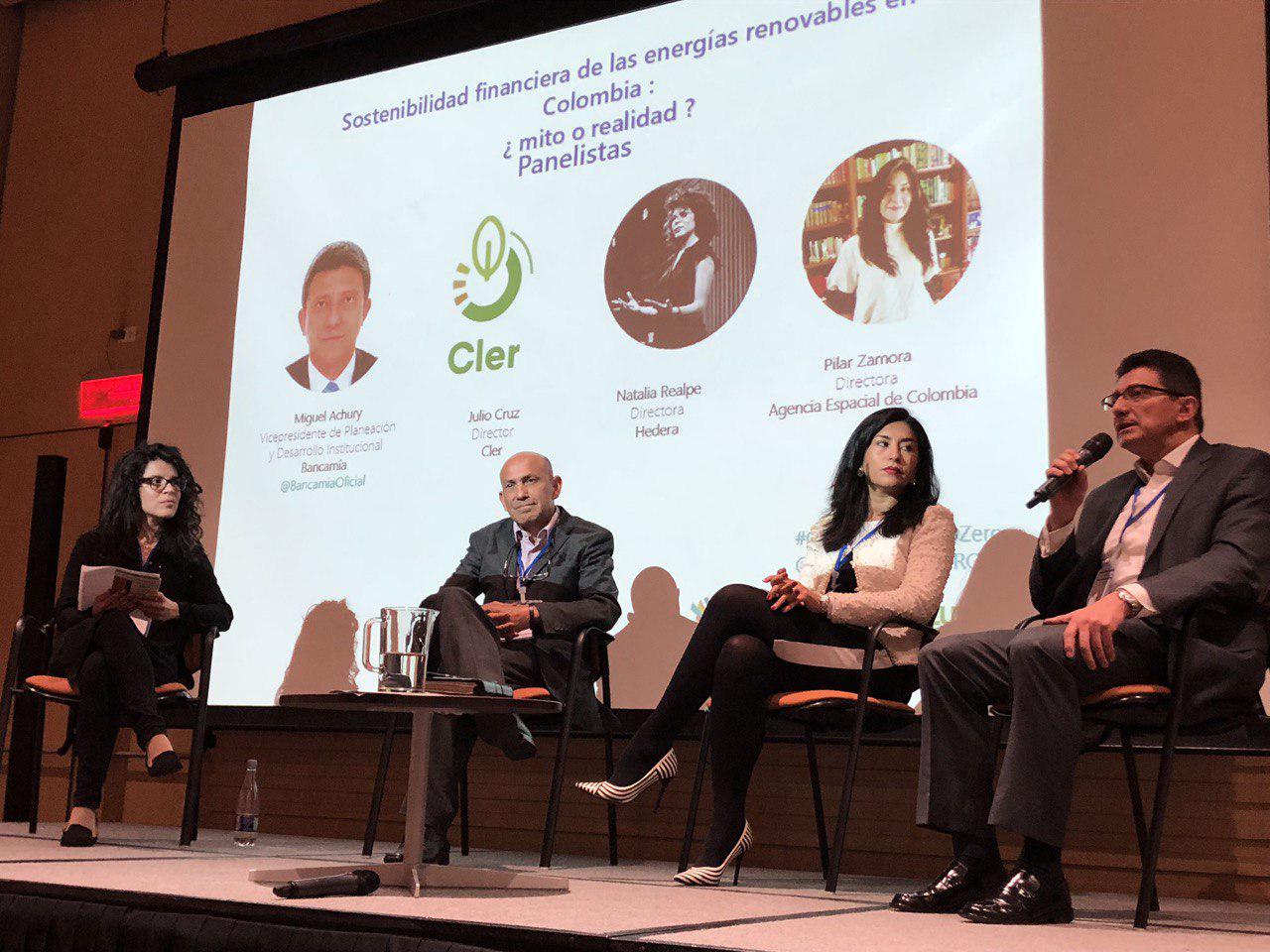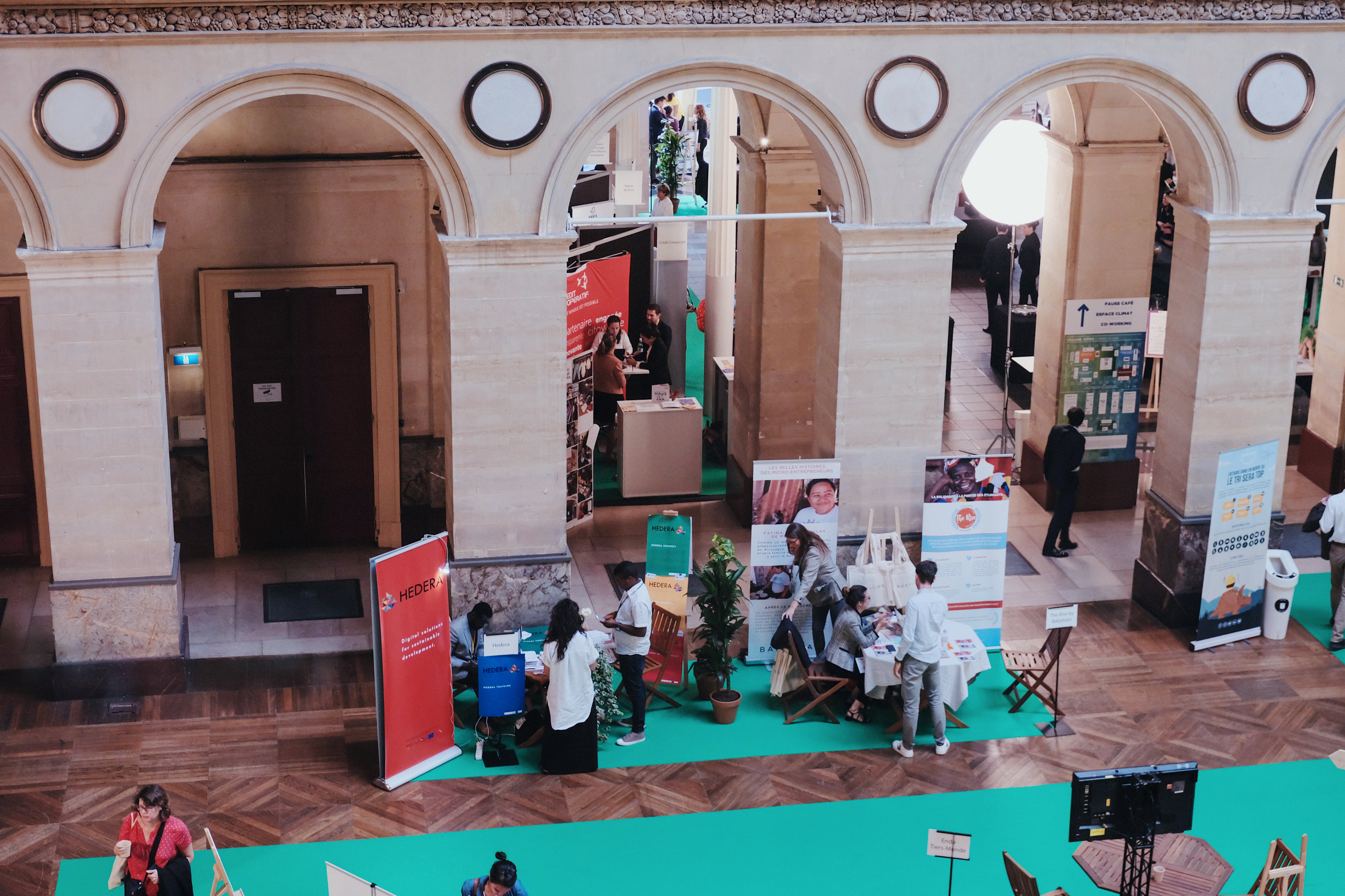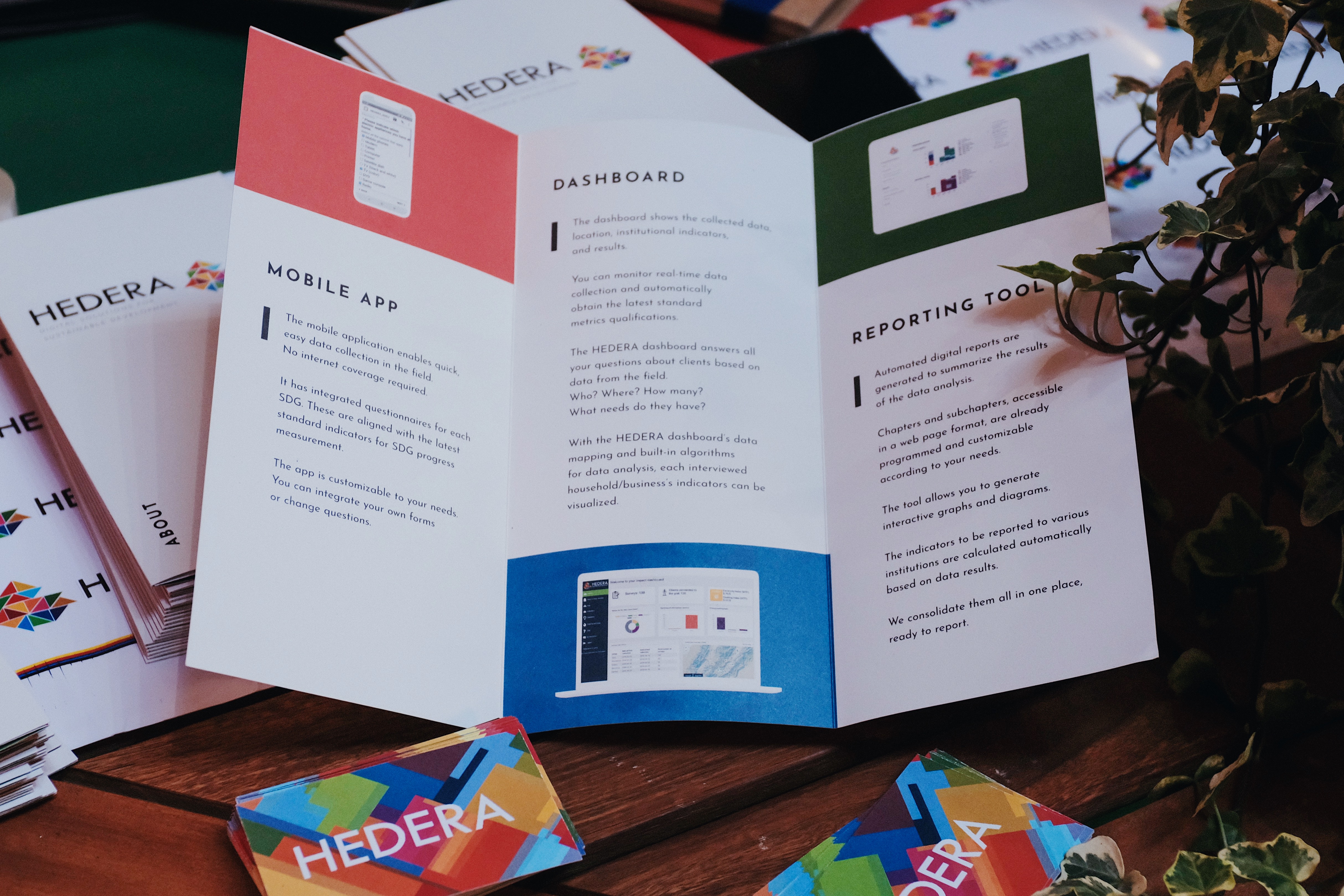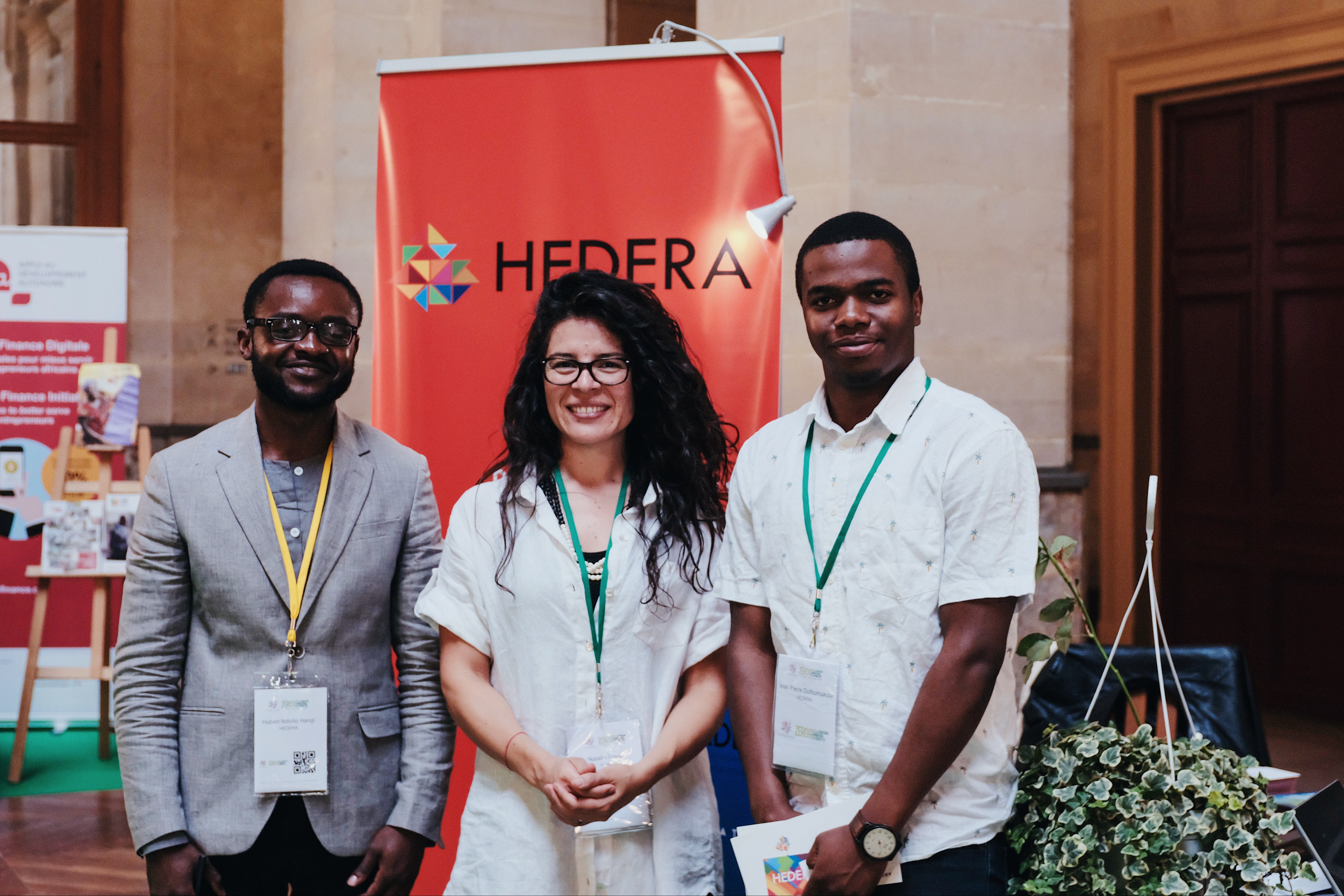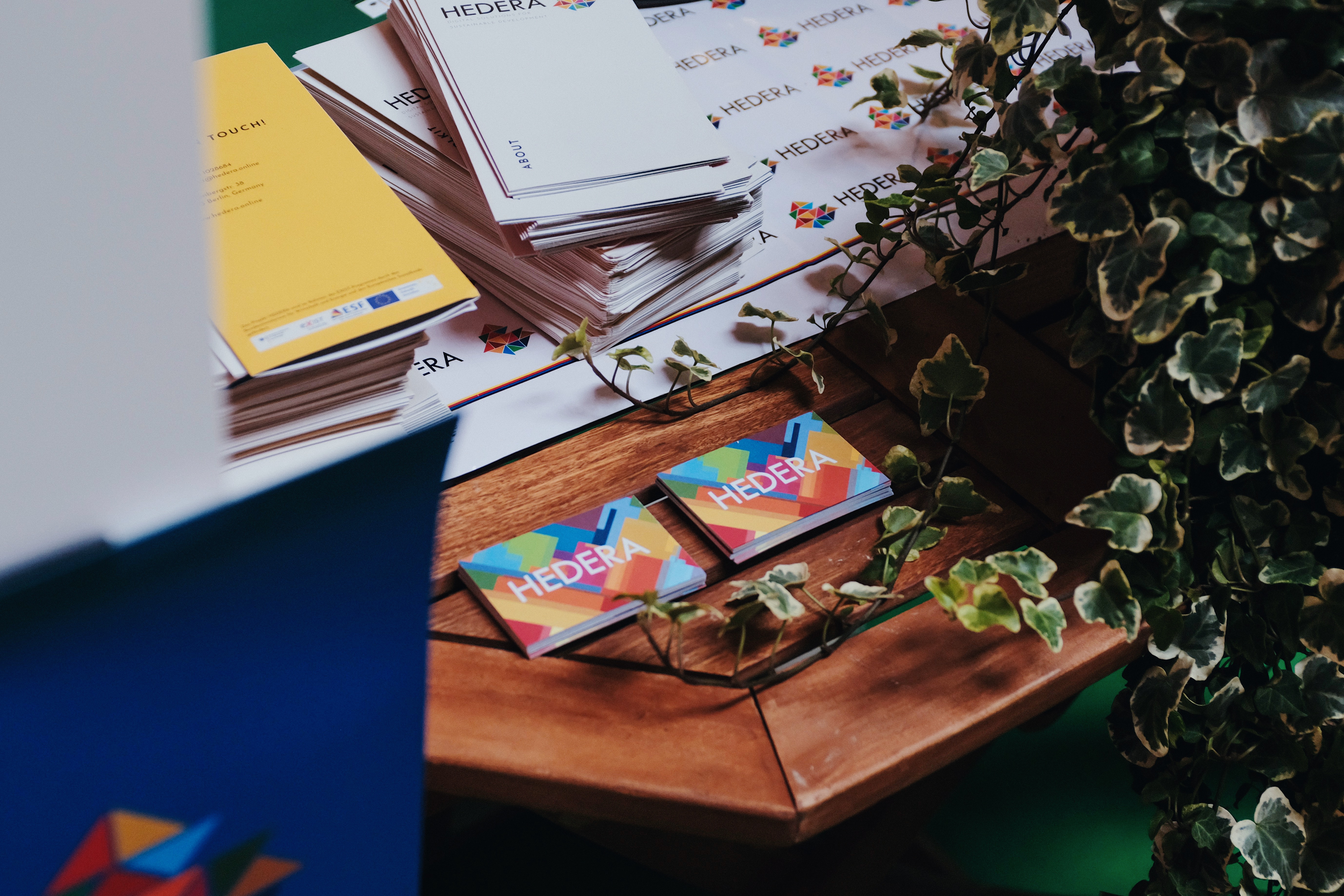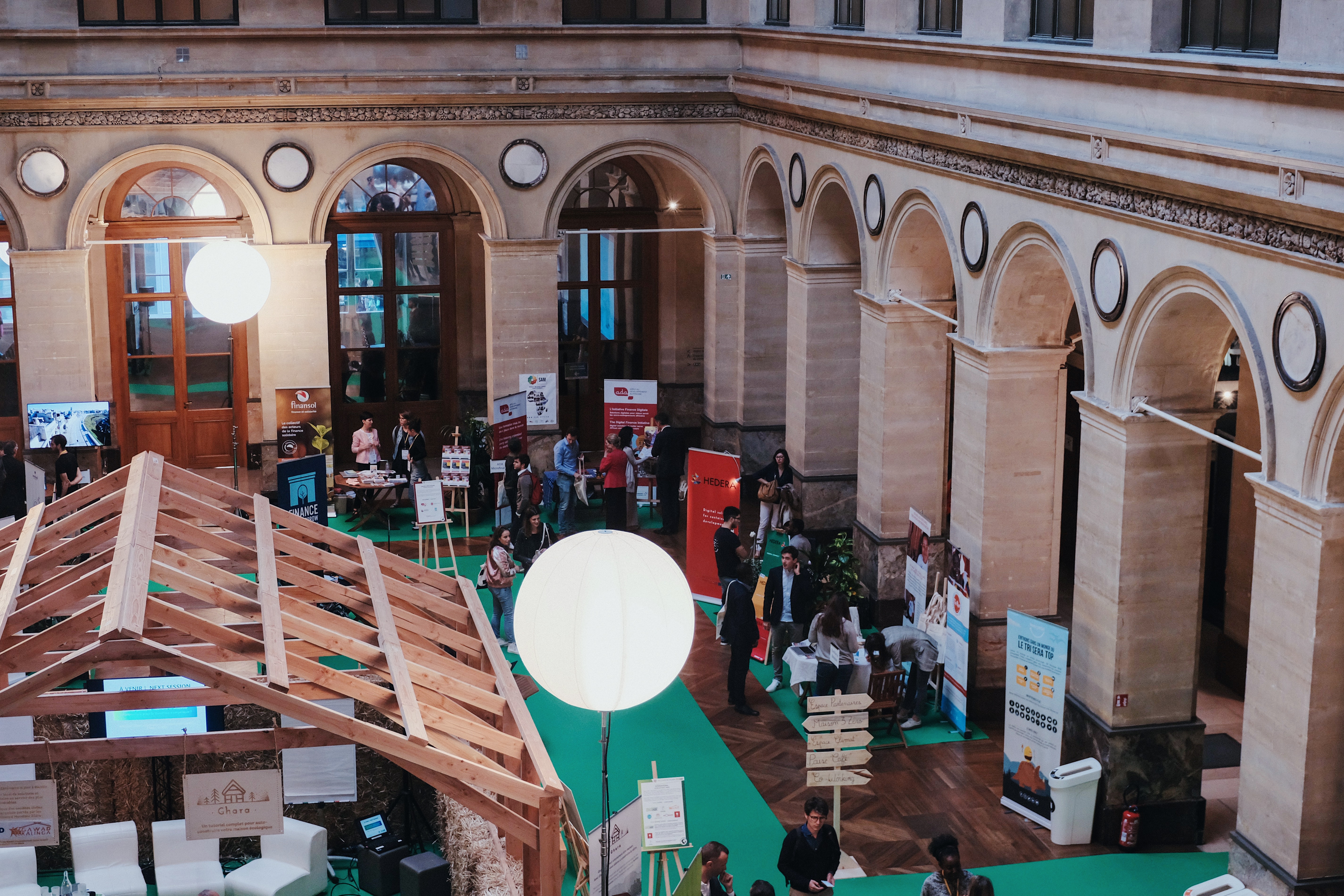NEWS
November
October
During the last African Microfinance Week, HEDERA organized the workshop From Insight to Impact: Enabling Green Inclusive Finance through Needs Assessment and Impact Measurement, and participated
to the Training organized by CERISE+SPTF, Entrepreneurs du Monde, and Fondation Grameen Credit Agricole on Social & Environmental Performance Management.
Natalia Realpe has been invited in the panel sessions What do we mean by sustainable inclusive finance? Definitions, taxonomies, labelling and Transparency and impact - measuring the real effect of sustainable inclusive finance to avoid greenwashing, where we
had the opportunity to present our work with our partners UNCDF, e-MFP, and Fortune Credit.
September
We are proud to have lead the technical development and the quality control of this project! Visit the map here!
2022
November
October
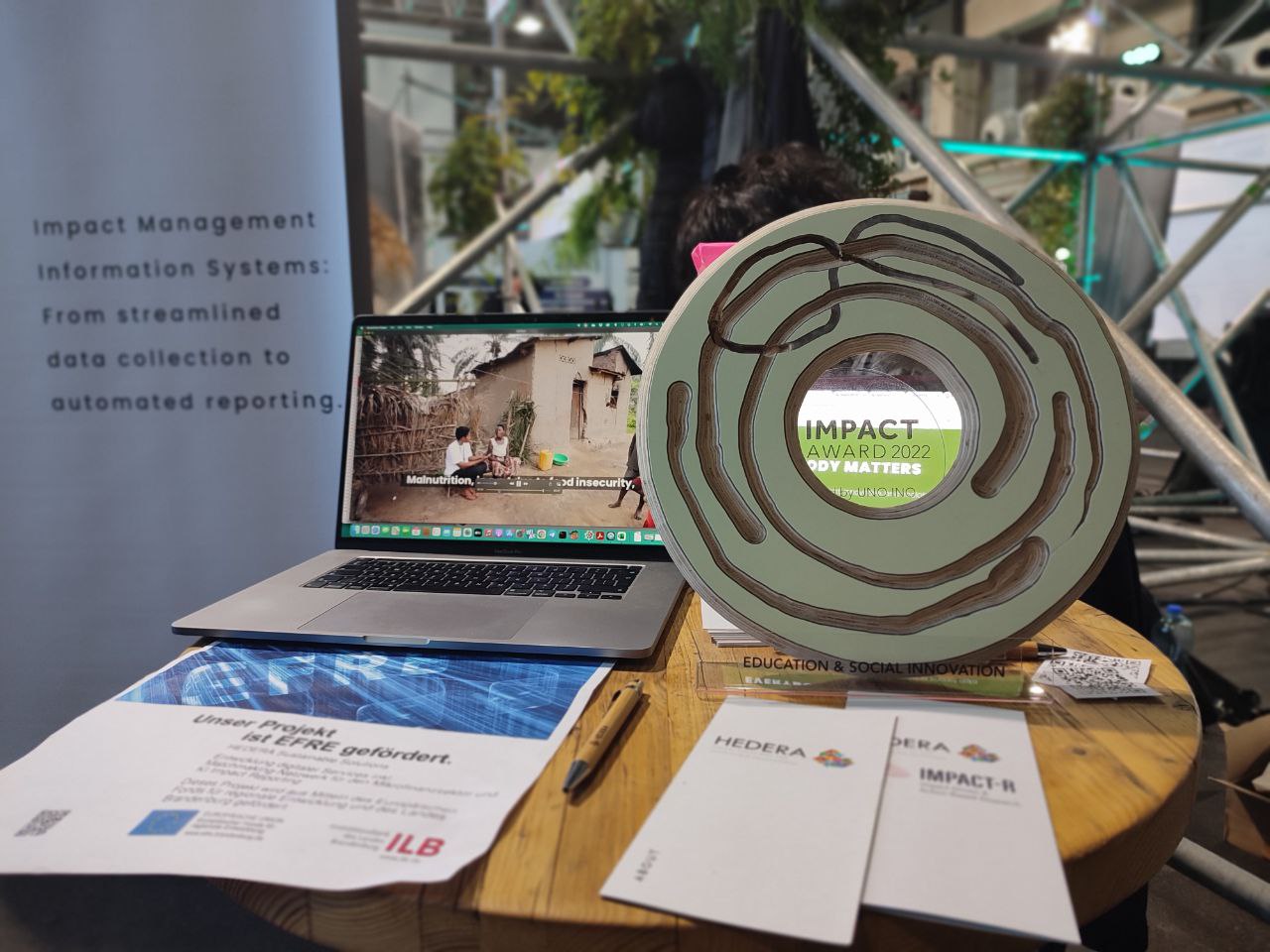
HEDERA has been awarded an impact award in the vategory education and #social #innovation at the
2022 IMPACT FESTIVAL!
More details here!
September
August
July
June
May
March
February
2021
December
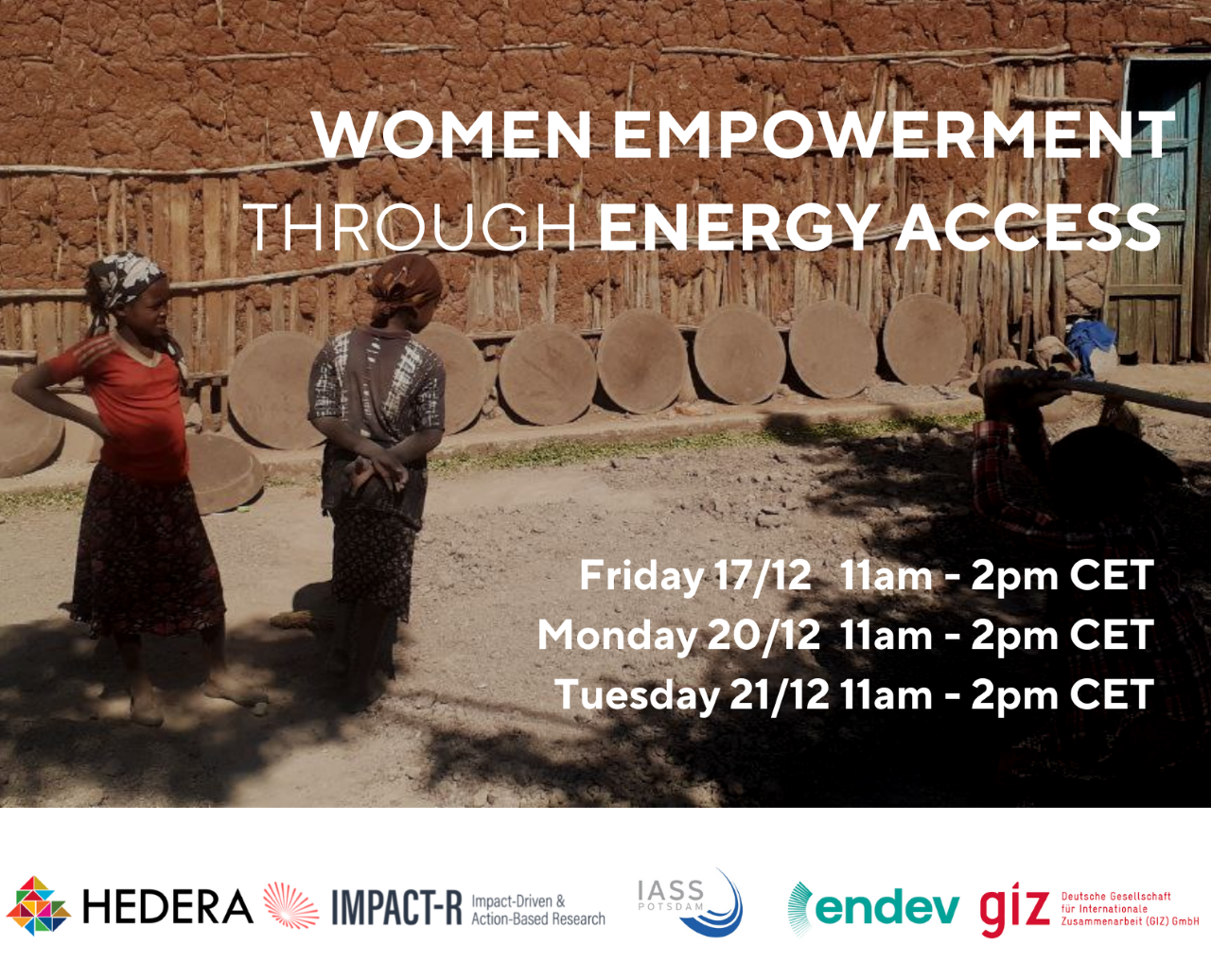
From Dec 17-21, 2021, HEDERA Sustainable Solutions, IMPACT-R and the Institute for Advanced Sustainability Studies, together with EnDev GIZ Ethiopia, are organizing a workshop / online seminar "Women Empowerment through Energy Access" as a deep dive into these subject in intersection with climate change adaptation, mainly focusing on improved cooking solutions. With the aim of translating the needs of ICS Suppliers and households to the policy sector, and identifying the gaps between programs and rural realities, we look forward to discussing aroung the subjects: adoption, traditions, aspirations, willingness to pay of households & financing, industralization and formalization of small and medium enterprises. For this, we will gather key experts in the field and invite them to share from their expertise their view on what does it mean women empowerment, from which lens should it be addressed and how can efforts being put together to foster it. The results of these workshop will be gathered for recommendations for the Ethiopian energy sector, based as well from inputs from experiences from Sub-Saharan Africa.
More info here.
November
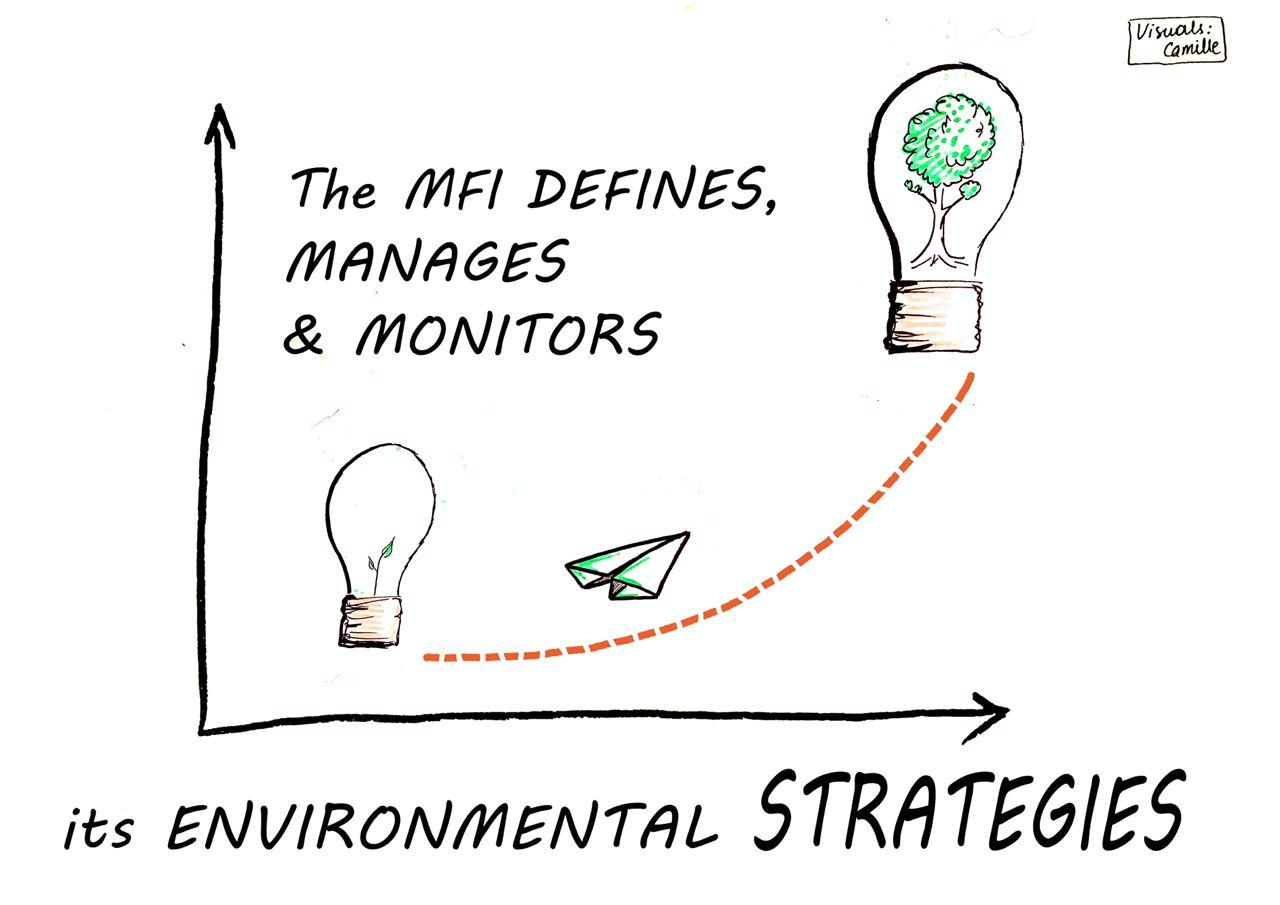
Umberto Trivella, Financial Inclusion and Project Management Specialist will present CIDR Pamiga’s experience in facilitating and supporting partnerships between microfinance institutions (MFIs) and energy companies to promote access to solar energy for low-income households in Benin, Senegal, and Madagascar.
Revisit all webinars of 2021 here.
The Green Inclusive and Climate-Smart Finance Action Group (GICSF AG) of the
European Microfinance Platform (e-MFP) is pleased to invite to the Green Index 3.0 for FSPs interested to know more about the
assessment and management of green inclusive finance performance.
HEDERA has supported the GICSF-AG since the beginning of 2020 with IT solutions, and we are glad to have been implemented
the first version of the Green Index 3.0 digital tool. Do not miss this opportunities to test the tool, be the first to
explore it, and provide us feedback!
Register here:
- English: Monday, 8.11.2021 10:00-11:30 CET
- Spanish: Wednesday, 10.11.2021 16:00-17:30 CET
- French: Friday, 12.11.2021 11:00-12:30 CET
More info here.
October
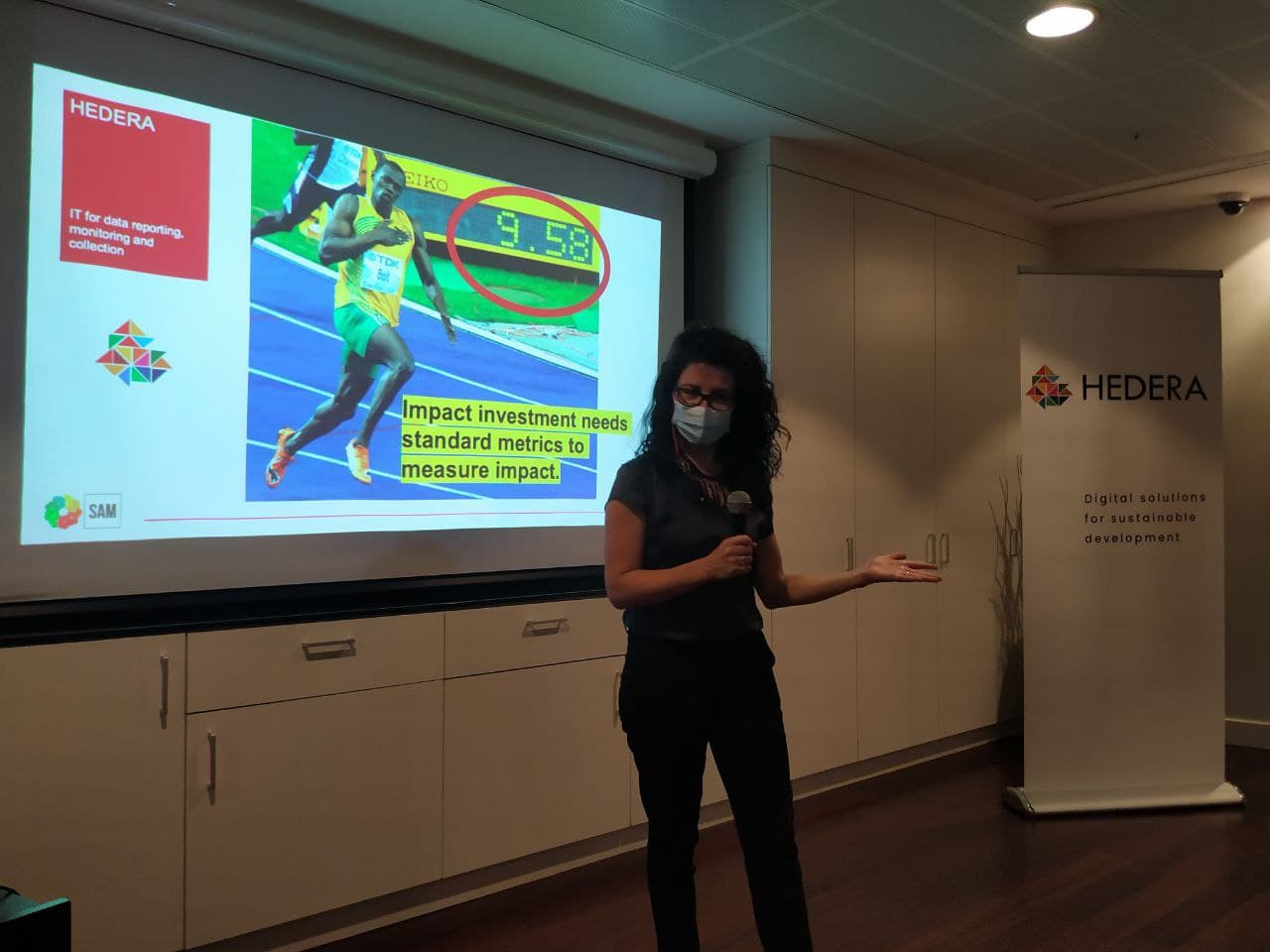
Hedera was honored to participate in the African Microfinance Week – SAM 2021. The major conference dedicated to the development of financial inclusion in Africa.
After the Innovators village HEDERA was awarded the prize for the most promising innovative digital impact management tool for the decentralized renewable energy sector. For us it is a great motivation to continue working for the sector, pursuing our mission of enabling all stakeholders to measure their impact on all their customers.
Our warmest thanks to Alliance for Rural Electrification David Lecoque for the award!
September
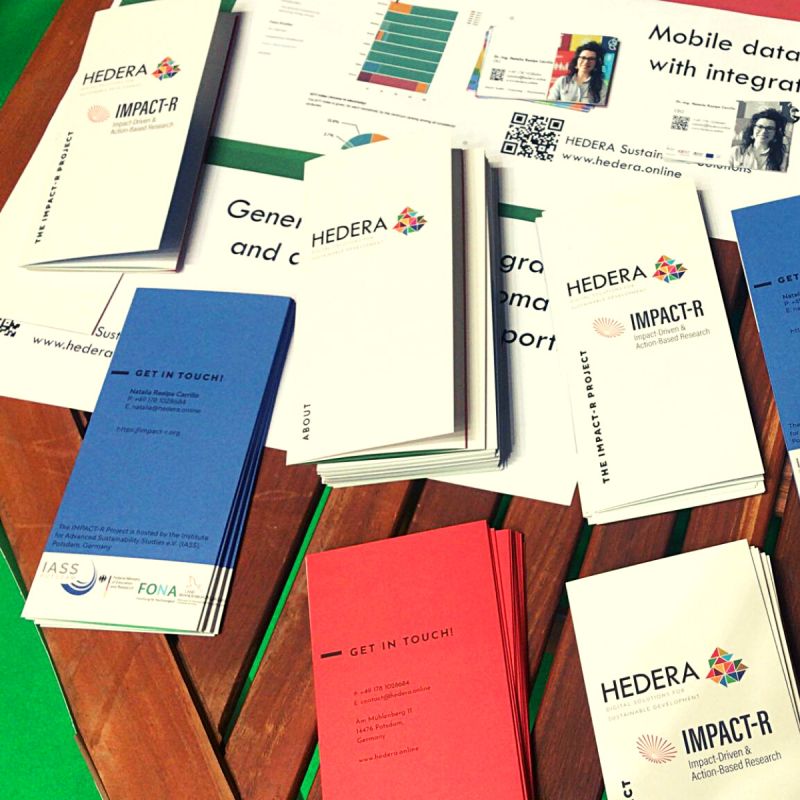
Big thanks to Convergences for inviting us to participate in the #3Zero World Forum!
Thanks to IMPACT Initiatives for the invitation to participate in the session: "Measuring SDGs and humanitarian needs in crisis contexts: multiply complementary and innovative sources of data for one common goal".
It was truly inspiring to have shared the panel with Abdul Latif Jameel Poverty Action Lab (J-PAL) and PAX for peace discussing about the methods, tools, challenges and ways forward on data collection for good.
We are proud to have participated at the #3Zero World Forum impressively organized by Convergences.
Thank you to everyone who stopped by our booth in the village. It was a pleasure to connect with each of you!
June, July, August
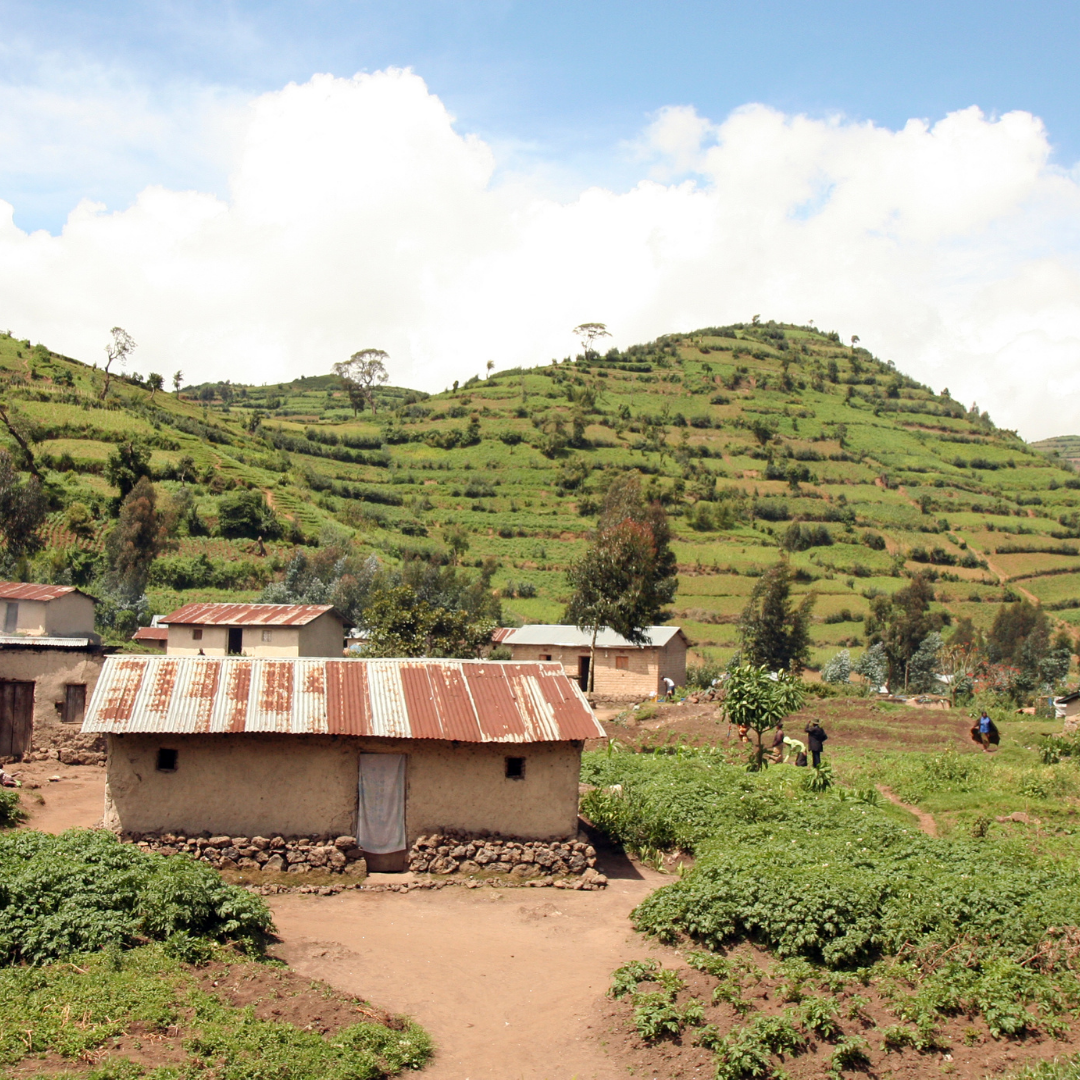
Collaborating with the German organization Sustainable Villages Foundation (SVF), a baseline study was conducted in April to assess the needs at the household level regarding access to energy, water, sanitation and hygiene (WASH), & food security and understand the priorities in the rural villages of Bisagara and Rugarama in Rwanda.
The study was conducted in the framework of IMPACT-R project using questionnaires based on the following methodologies:
the ESMAP Multi-Tier Framework (MTF) for energy access assessment,
WHO/UNICEF Joint Monitoring Program for WASH, and
FAO Food Insecurity Experience Scale (FIES) for food security.
On June 14th, IASS Klaus Töpfer Sustainability Fellow Natalia Realpe and Joachim Hauschopp from SVF gave a presentation on the project,
including what they did, the methods, the role of digitization and tools from HEDERA, and most importantly, the “why” of their work.
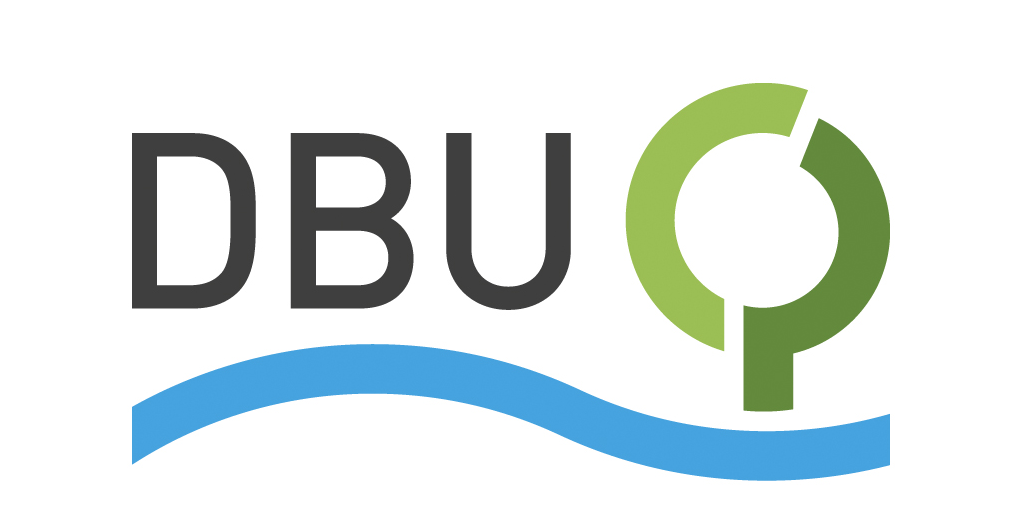
We are proud to be participating in the Environment Week (Woche der Umwelt) organized by the
Deutsche Bundesstiftung Umwelt as one of the Green Start-up Program teams.
The DBU's Start-up Program is aimed at founders and start-ups. Funding is provided to companies that are no more than five years old and that combine solutions for the environment, ecology, and sustainability with a particular added value for society in an innovative way.
We invite all recently founded start-ups that combine these types of solutions to participate and get to know this amazing program.
More information: here
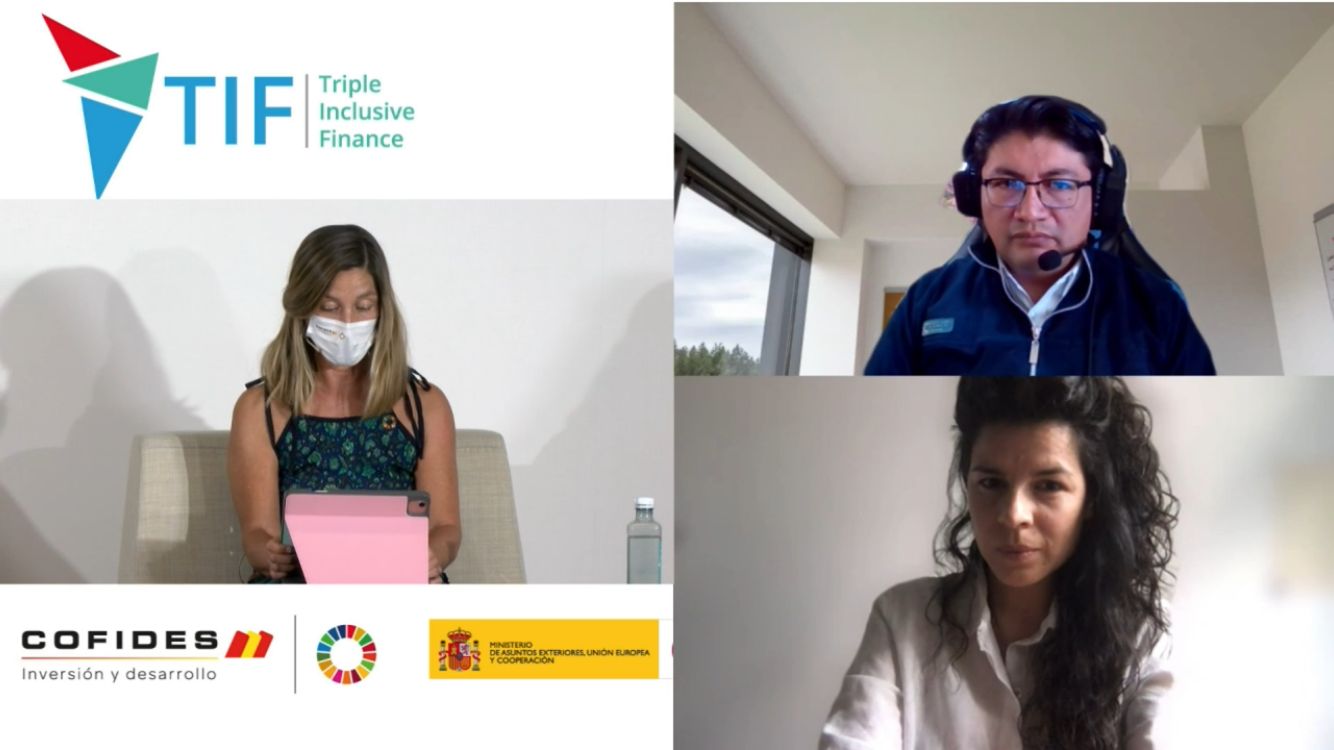
The TIF Program (Triple Bottom Line Inclusive Finance in Latin America) aims to provide Latin America's low-income population with greater and better access to finance, while enabling both environmental and social sustainability.
On June 10th, Natalia Realpe Carrillo had the honor of representing HEDERA and the e-MFP Green Inclusive & Climate Smart Finance Action Group (GICSF AG) at the
Technical Assistance in Financial Inclusion - TIF Program organized by COFIDES. At the event, Natalia spoke about the importance, evolution, and perspectives of green inclusive finance in Latin America.
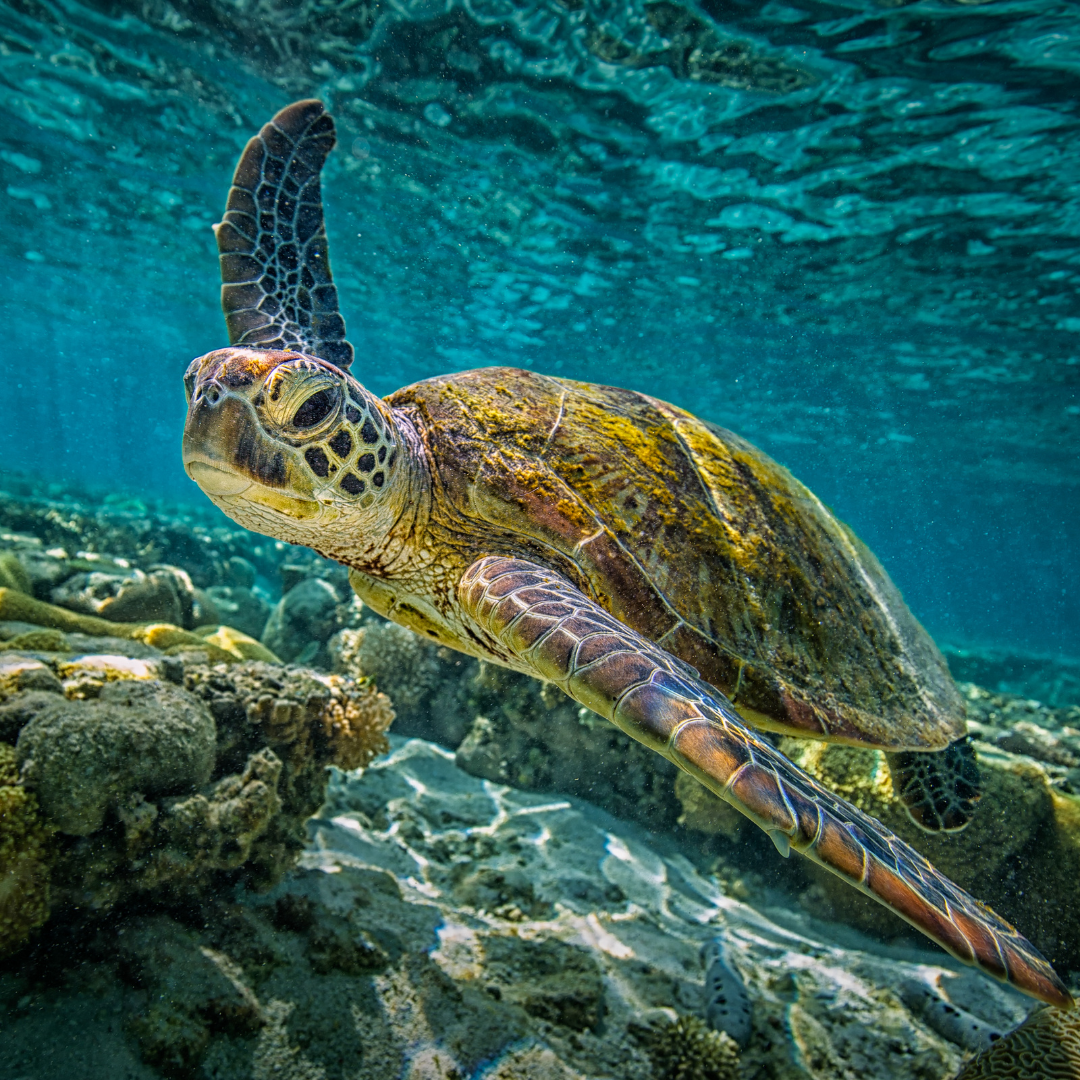
On June 10th, the e-MFP Green Inclusive & Climate Smart Finance Action Group (GICSF AG) organized a webinar focused on climate change and 'Nature-based Solutions' (NbS).
Nowadays, there is growing awareness that Nature-based Solutions can help protect the planet from climate change impacts while slowing further global warming, supporting biodiversity, and securing ecosystem services.
Jason Spensley, a specialist from the Global Environment Facility, shared key lessons learned for the green inclusive sector.
During this webinar, Jason Spensley and Davide Forcella outlined a suite of opportunities for ambitiously increasing the scale of financing invested in climate change adaptation and transitioning to climate resilient economies. The potential of NbS to address the climate crisis, as well as drive a climate resilient recovery from the current pandemic, was discussed. Learnings and perspectives were shared from the Global Environment Facility on its role—alongside the suite of sources of multilateral finance, including the Green Climate Fund and the Adaptation Fund—to address the interconnected climate and biodiversity crises with governments, local communities, and a range of private sector actors. Examples included the specific case of green inclusive finance projects, exploring the pivotal role green finance can play in climate change adaptation and biodiversity conservation for vulnerable populations, particularly smallholders and rural communities.
Click on this link
to watch the recording of this webinar.
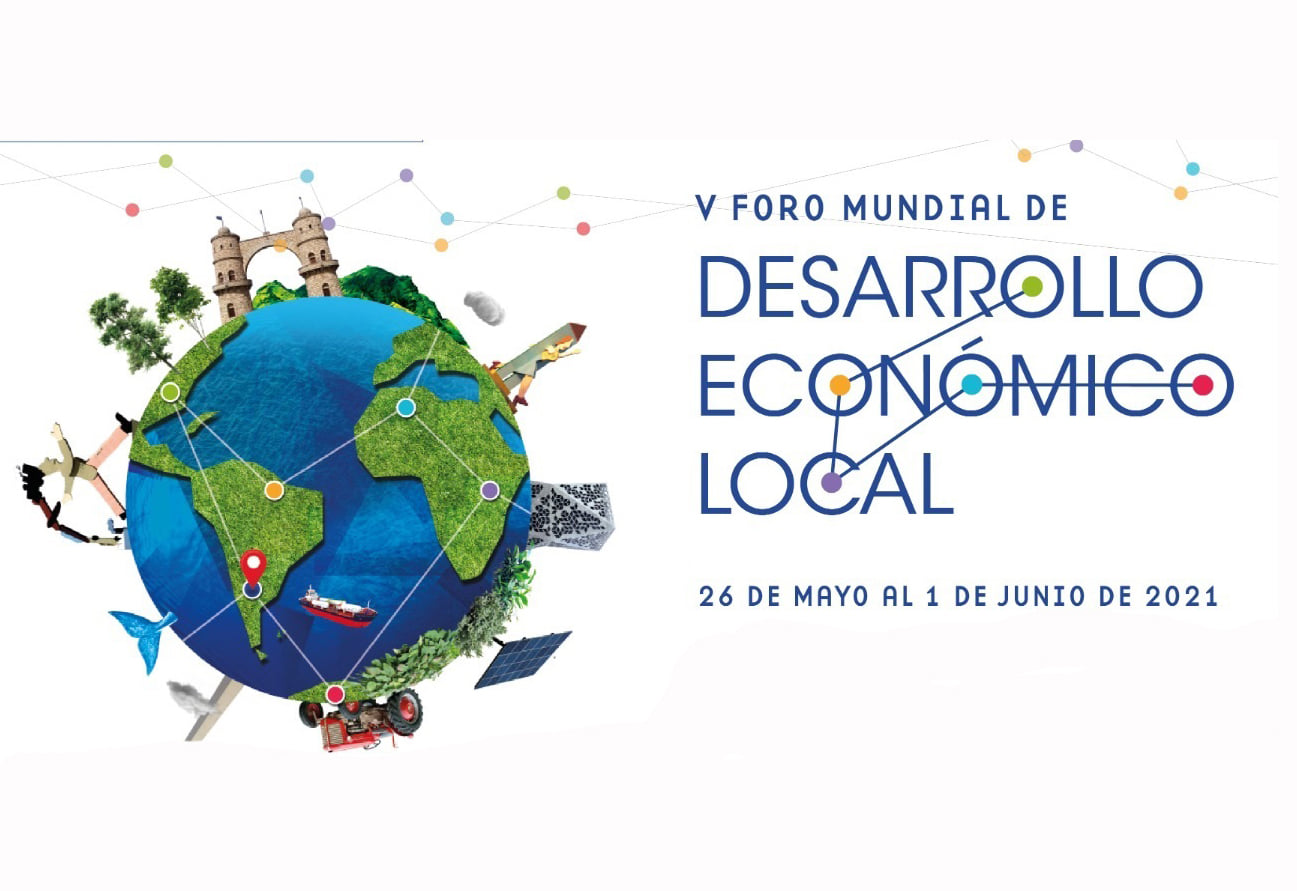
Convergences is currently working collectively with Comité 21, Cités Unies France, La Fonda, Le RAMEAU, with the support of Ministère de l'Europe et des Affaires étrangères, and UNDP on a publication to decode the SDG17 and its 19 targets and promote the importance of partnerships.
On June 1st Natalia Realpe had the pleasure of announcing and promoting this upcoming publication at the 5th World Forum on Local Economic Development, organized by UNDP, at the session "Dialogue on city-to-city partnerships as a key tool to address the 2030 Agenda and advance the Sustainable Development Goals," moderated by the Centro de Innovación en Tecnología para el Desarrollo Humano itdUPM of the Universidad Politécnica de Madrid.
The panelists from Montevideo, Praia, Sucre, La Paz, and Madrid shared their experiences in city-to-city alliances and what can be done to encourage their development. Participants also discussed how to overcome the challenges of building up alliances between cities by including different stakeholders that contribute to the achievement of the SDGs in each city.
For HEDERA, it was great to be able to share the progress we have made through our HEDERA Connect platform, bringing organizations together and enabling them to track access to basic services at the household level with our
IMPACT-R project.
Save the date and stay tuned for news from Thibault Larose on the launching of the publication on July 5th, 2021!
May
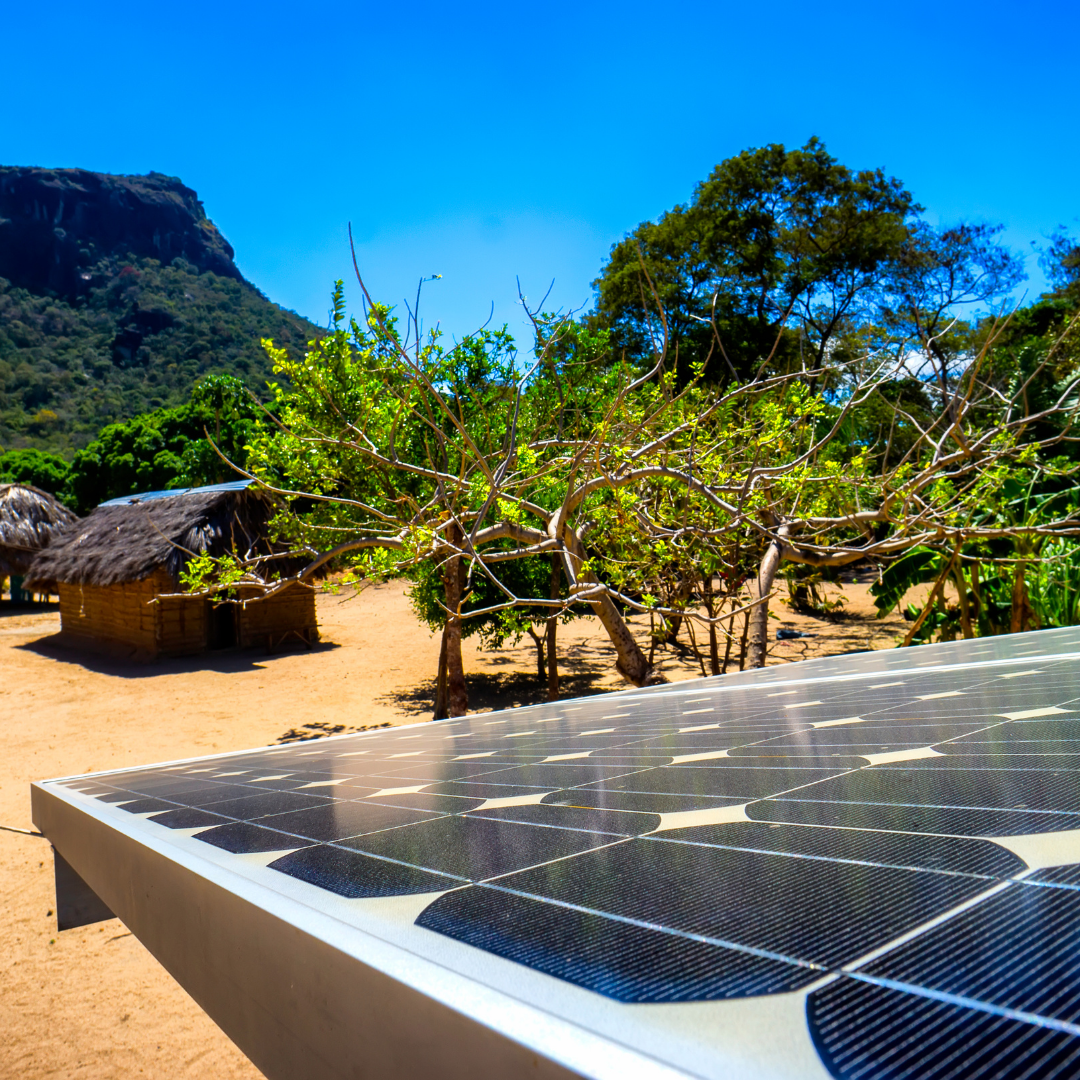
Dr. Niklas Hayek from the University of Applied Sciences RheinMain, responsible for coordinating a lecture series in the Bachelor Program “Interdisciplinary Engineering,” invited Natalia Realpe to be a guest lecturer on May 31st, 2021. The series addresses various topics related to international development cooperation with relevance for future engineers and involves experts from various organizations and companies.
Natalia introduced the students to the linkage between microfinance and energy access, emphasizing the role of engineers in designing, optimizing, and managing solutions for sustainable development.
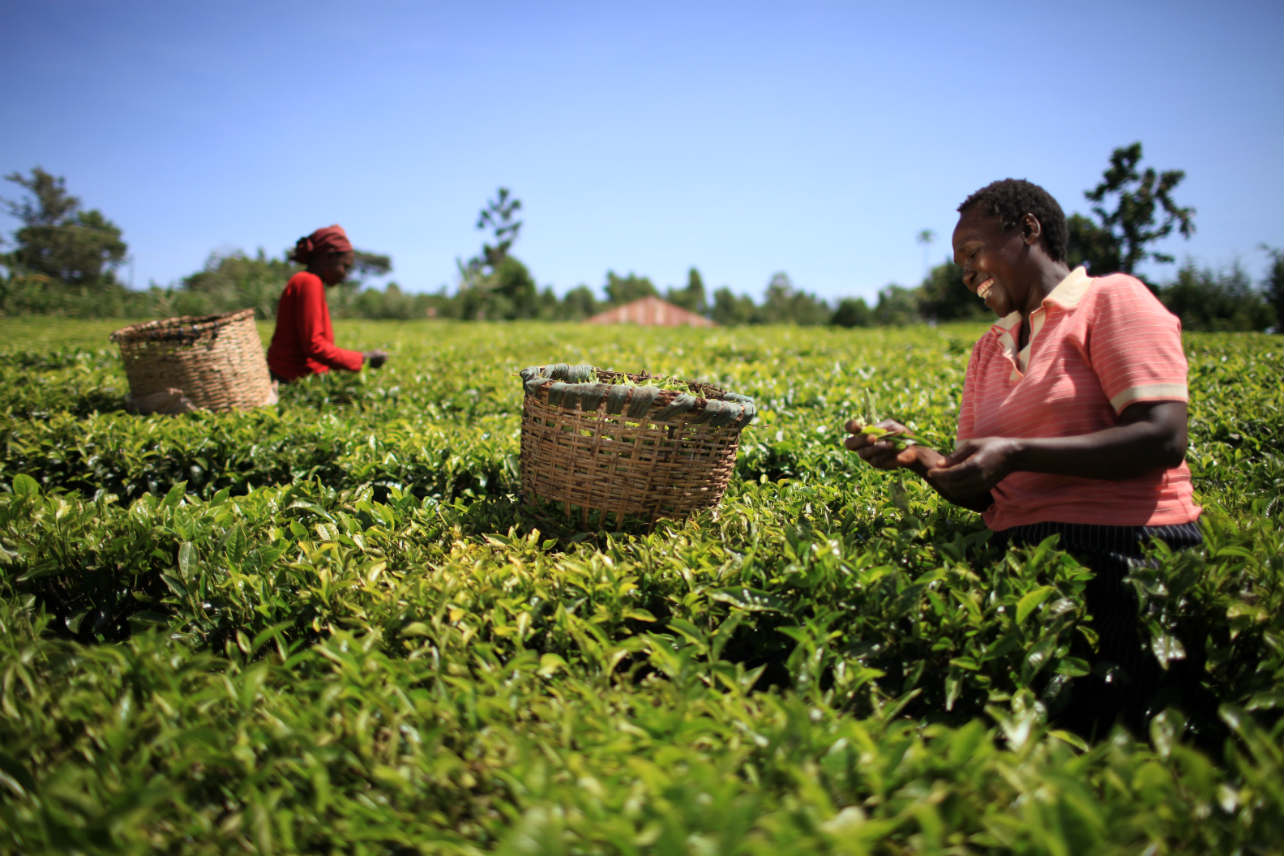
On May 20th, the e-MFP Green Inclusive & Climate Smart Finance Action Group (GICSF AG) hosted a special guest, Patrick Flynn, who gave an introduction to Kiva's environmental lending and how the organization is developing an ambitious long-term environmental strategy.
Kiva is a U.S.-based non-profit organization with a mission to help underserved communities thrive. Historically, Kiva has pursued this mission through a crowdfunding platform that allows individuals to lend as little as USD 25 to micro-entrepreneurs and small businesses around the globe who have limited access to capital. Over the past 15 years, USD 1.6 billion has been lent through Kiva to over 3.5 million borrowers in over 80 countries.
Kiva has recently added two new impact lines, Kiva Capital and Kiva Protocol, in order to expand their service offerings and scale up their impact even further. As Kiva continues to scale, it is looking to create a long-term strategy with respect to environmental protection. This entails defining what types of loans are eco-friendly, what types of activities fit Kiva's investment model, and what role third-party organizations may play within the strategy.
Click on this link
to watch the recording of this webinar.
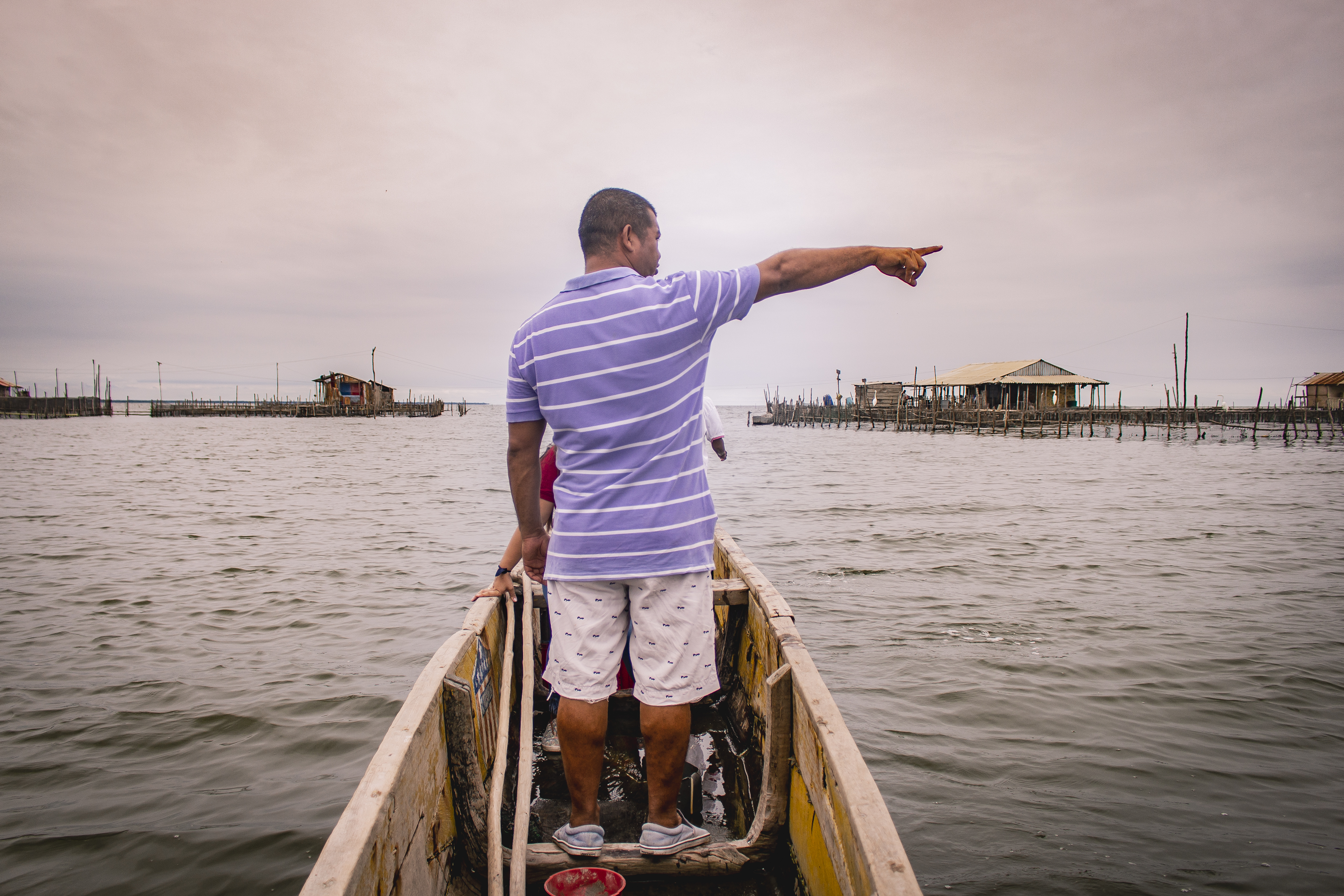
HEDERA is honored to be part of the interdisciplinary project "Application of collaborative and solidarity economy models to close energy access gaps and reduce poverty in the municipality of Puebloviejo,” which aims to improve access to energy and basic infrastructure in the Magdalena region of Colombia.
Thanks to the leadership and continuous work of the Universidad del Magdalena, the research contribution of the Institute for Advanced Sustainability Studies (IASS), HEDERA's digital tools for sustainable development, and the support of the Technische Universität Berlin, a path has been set to fulfill this ambitious objective.
As part of the project development, a dialogue between academia and local stakeholders was held on May 14th in order to gain perspectives on the social radiography of the municipality and basic criteria for the effective implementation of a Living Lab.
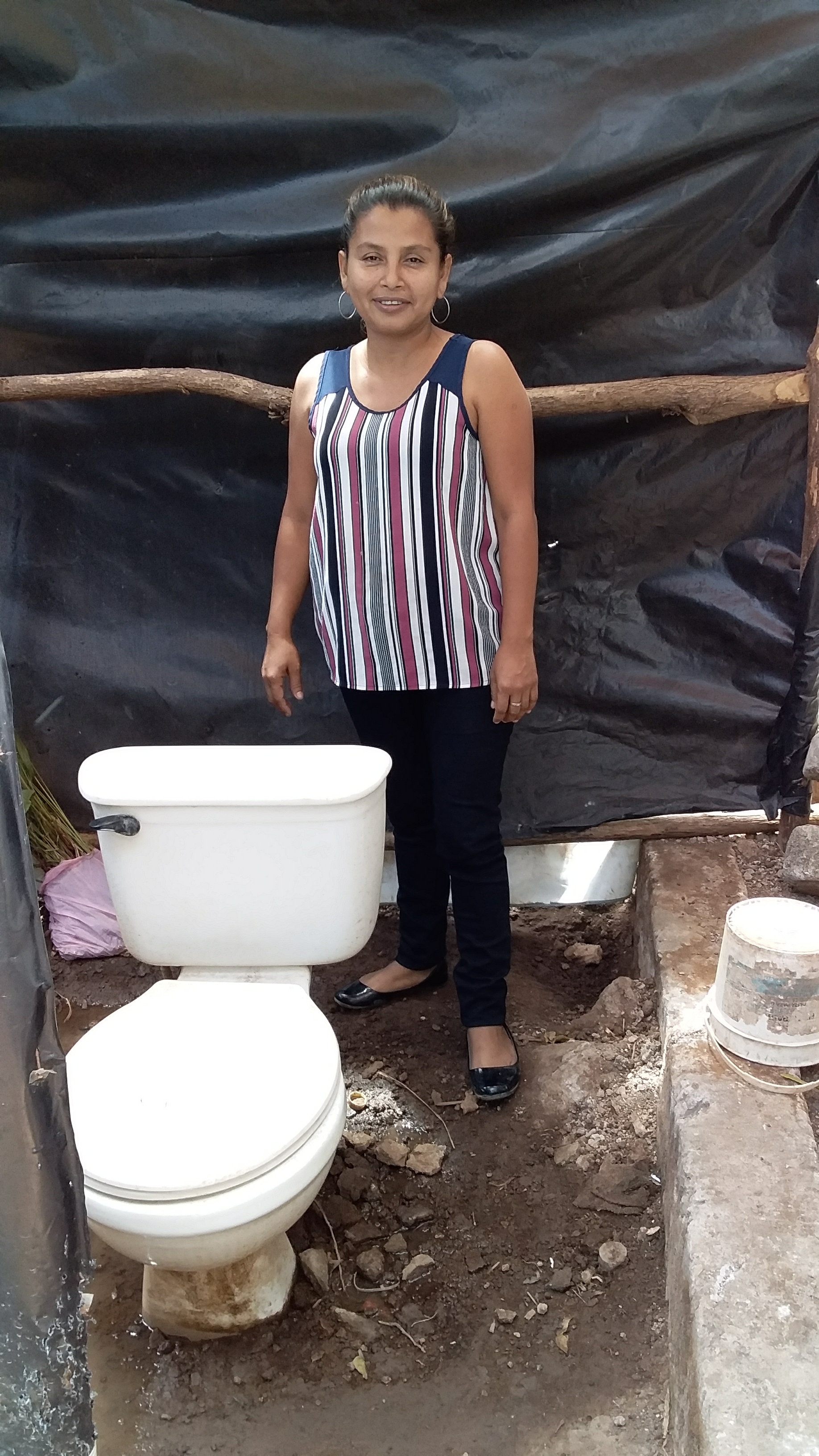
Continuing with the webinars series organized by the e-MFP Green Inclusive & Climate Smart Finance Action Group (GICSF AG), on May 6th, Veronica Herrera, CEO of MiCrédito, shared their experience as a microfinance institution providing water, sanitation, and hygiene (WASH) loans in rural and peri-urban areas of Nicaragua. The presentation examined MiCredito's achievements and challenges in implementing a line of credit focused on WASH access that ultimately aims to improve the quality of life of the target communities and protect the environment.
Click on this link
to watch the recording of this webinar.
April
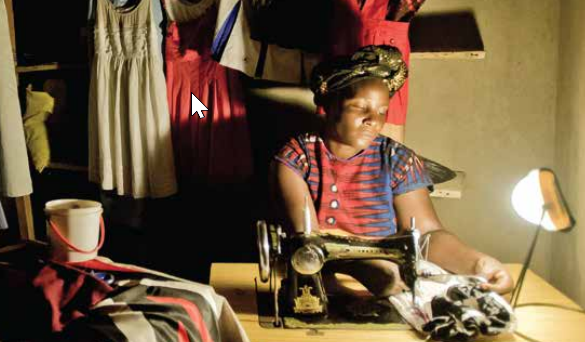
As part of the webinar series organized by the e-MFP Green Inclusive & Climate Smart Finance Action Group (GICSF AG), on April 22nd, the webinar "Green Inclusive and Climate Smart Finance:
Challenges and opportunities for clean energy in Ethiopia" was held.
At this event, Seifu Teshome from the United Nations Capital Development Fund (UNCDF)
presented his experience in supporting energy and microfinance linkages in Ethiopia and UNCDF's role as a
key stakeholder in promoting energy access in sub-Saharan Africa.
Ethiopia represents one of the largest off-grid markets in sub-Saharan Africa. This, in turn,
means that Ethiopia is one of the largest markets for clean energy expansion.
Given the challenges and needs in terms of energy access, UNCDF, in collaboration with the United Nations Development Program (UNDP), Development Bank of Ethiopia, and Ministry of Water, Irrigation, and Energy, launched a credit risk guarantee scheme. This financing mechanism aims to leverage pipeline development and secure financing for off-grid energy companies. One of the challenges of this scheme is the low uptake of the guarantee facility, along with pay-as-you-go services and microfinance lending to end-users. This situation differs from other markets such as Nepal and Uganda, where pay-as-you-go services and microfinance are well-established. On the other hand, the government has defined the elimination of greenhouse gas emissions as essential to becoming a middle-income country, and to achieve this goal, a coordinated multistakeholder intervention is required. In this regard, UNCDF's Inclusive Digital Economy (IDE) Energy program brings significant value in both developing Ethiopia's energy market and strengthening partnerships between financial institutions and clean energy companies.
Click on this link
to watch the recording of this webinar.
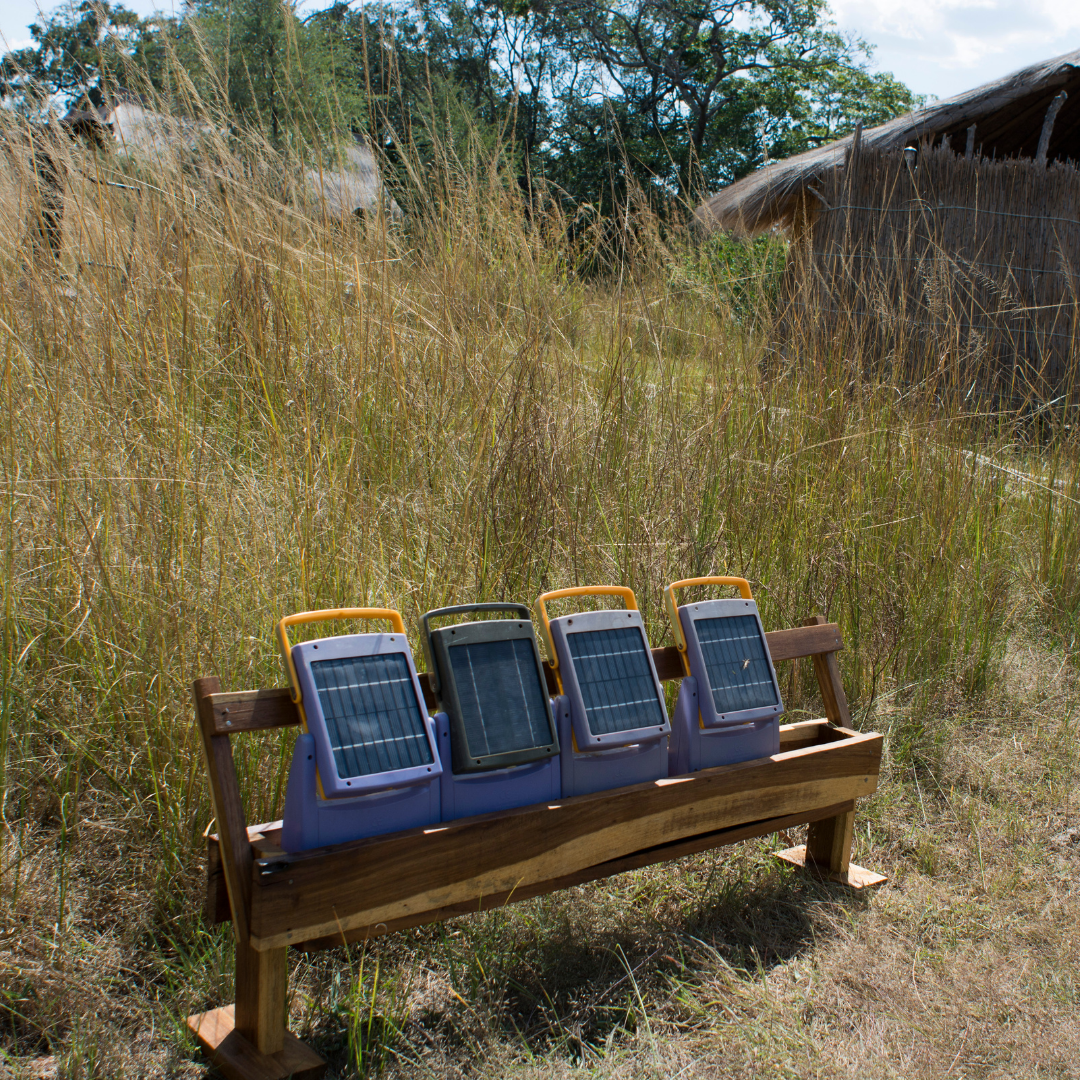
On April 8th, the e-MFP Green Inclusive & Climate Smart Finance Action Group (GICSF AG) hosted a webinar on the challenges of
financing clean energy technologies in rural areas.
The experience of BrightLife in enabling access to affordable energy in Uganda provides a series of learnings for the microfinance sector.
Founded by the global microfinance pioneer FINCA International, BrightLife has developed a model
that ensures access not only to energy, but also to finance. Based on the results of a study
conducted by FINCA and CGAP, a financial product was designed through which clients, after paying for the
technology over a 12-month period, can have access to credit at FINCA Uganda. Such a system has shown interesting results on the relationship between clean energy credit scoring and subsequent scoring on the finance side. What are the opportunities, risks, and challenges for microfinance institutions to provide access to energy and to finance in one program? Andrew Muhwezi and Natalia Realpe discussed the challenges, opportunities, and learnings encountered by BrightLife and Penda Capital - an NGO that offers financial services to women and youth entrepreneurs in Kampala, in its journey to boost financing for clean energy technologies in rural areas in Uganda.
Click on this link
to watch the recording of this webinar.
Within the framework of the
Impact-Driven and Action-Based Research project
(IMPACT-R), comprehensive data collection on energy access at the household and business level
(productive uses) and water, sanitation, and hygiene and food security at the
household level has started with
10 organizations and consortiums in Latin America, Sub-Saharan Africa, and South Asia.
Microfinance institutions, NGOs, and research institutions interested in providing solutions,
whether by enhancing existing products or developing new green inclusive products and services
within their organizations, will be conducting field research in their areas of
operation in Haiti, Nicaragua, Colombia, French Guyana, Senegal, Uganda,
Democratic Republic of the Congo (DRC), Rwanda, Zambia, Nepal, and India.
Through the digital tools provided by HEDERA, the data collection campaigns will gather
data on standard indicators to track the status of SDGs 1, 2, 6, and 7 and develop a
baseline for each organization for future impact assessment, employing international
frameworks from the World Bank, United Nations (UN) Joint Monitoring Programme, and
Food and Agriculture Organization of the UN.
The IMPACT-R project is hosted by the
Institute for Advanced Sustainability Study e.V.
(IASS)
and cooperates with research organizations in each country.
March
Closing the series on Latin American experiences in this first quarter of the year,
the Green Inclusive and Climate Smart Finance Action Group hosted a webinar
to discuss the challenges and opportunities encountered by REDCAMIF in its journey of fostering green inclusive finance in its region of intervention.
Across the Central American region, there is a growing need for critical changes in agricultural practices and other sustainable economic activities, especially at the level of small producers and farmers, who need financing and technical support to introduce sustainable ways of farming and agro-production.
The webinar focused on the progress the microfinance sector in Central America has made in promoting green finance, as well as the present and future challenges and opportunities identified in the regional markets.
The speaker, Allan Pérez, project coordinator at REDCAMIF, a regional microfinance association with 100 institutional members and seven national microfinance networks that supports the microfinance sector and promotes sustainable economic and human development, shared REDCAMIF's experience in promoting green finance in Central America and the Dominican Republic, strengthening microfinance institutions to provide financial support for investment needs, productive assets, and good environmental practices.
The call, organized by the
Impact-Driven and Action-Based Research (IMPACT-R) project and the
Institute for Advanced Sustainability Studies (IASS) and focusing on research on access to water, energy, sanitation, and hygiene and food security in rural areas, garnered significant interest among a wide range of organizations.
Over 100 applications were received from MFIs, cooperatives, NGOs, and basic service providers in Latin America, Africa, and Asia. The selection process was very rigorous and intense.
We were happy to see solid and cost-effective proposals with high social impact. At the end of the selection process, seven organizations were carefully chosen. The selected organizations are located in Nicaragua, Haiti, Nepal, India, Uganda, Senegal, and Zambia.
Congratulations to all the winners of this call!
Find out more information about this project here.
February
On February 18th, HEDERA participated as a speaker in the Off-grid Renewable Energy Statistics Online Conference organized by the International Renewable Energy Agency (IRENA). Natalia Realpe Carrillo, HEDERA CEO, presented ways to measure energy access using digital tools that align with and support the World Bank ESMAP Multi-Tier Framework's objectives. We are proud to contribute to this conversation and empower local organizations to track their impact.
On February 18th,
the e-MFP
Green Inclusive & Climate Smart Finance Action Group (GICSF AG) hosted a webinar on the challenges and opportunities associated with linking microfinance services to transformations towards sustainability.
In recent years, the actions taken by MFIs in terms of sustainability and the environment have become more relevant and are no longer merely anecdotal.
This is increasingly visible in terms of institutions launching green products and practices.
Through concrete examples, Frédéric Huybrechs, from the
Institute of Development Policy - University of Antwerp, and Natalia Realpe Carrillo, HEDERA CEO, discussed how microfinance actually contributes to changes on the ground and how this relates to questions of sustainability.
January
The e-MFP
Green Inclusive & Climate Smart Finance Action Group (GICSF AG)
,
which is
co-headed by Natalia, invites everyone interested in green inclusive finance to the
third and fourth editions of its webinar series:
3rd edition: 14 January, 4:15 pm CET / 10:15 am ET - Jana Vandoren: tba
4th edition: 21 January, 4:15 pm CET / 10:15 am ET - Maximilien Pary: tba
More information and registration links will be provided when available.
Green Index webinars by CGAP are being hosted in
different languages in January:
Finanzas verdes inclusivas para las IMF: Evaluación y apoyo para la mejora – The
Green Index. (In Spanish)
14 January, 5 pm CET / 11 am ET
Register here.
Finance inclusive verte pour les IMF : évaluation et accompagnement à
l'amélioration - The Green Index. (In French)
21 January, 3 pm CET / 9 am ET
Register here.
Evaluation and Support for Improving Inclusive Green Finance for MFIs - The Green
Index.
20 January, 3 pm CET / 2 pm GMT / 9 am ET
Register here.
2020
Natalia, as co-head of the European Microfinance Platform (e-MFP) Green Inclusive & Climate Smart Finance Action Group, helped
coordinate the 2nd GICSF AG webinar, on 'Microfinance and Climate Change'.
In this edition, Philippe Guichandut, from the Foundation Grameen
Credit Agricole, shared the results of a study it conducted among its
partners on climate change, segregating them based on Green Index scores.
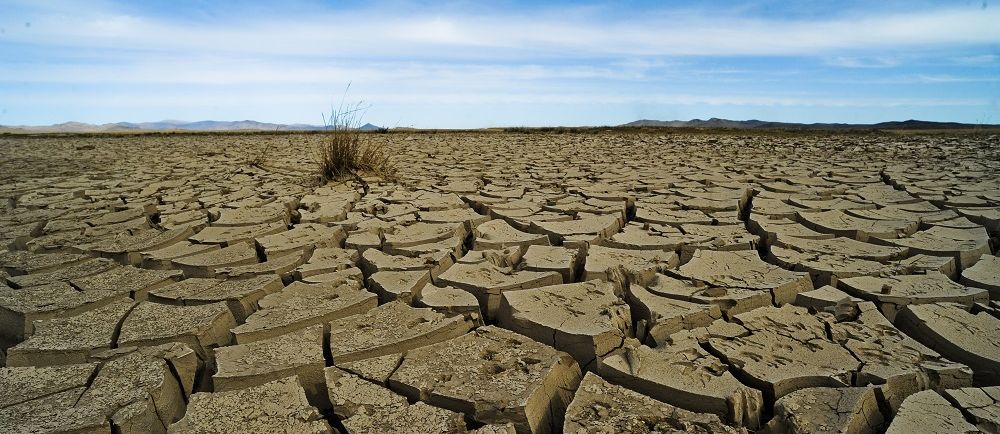
See the webinar announcement here.
Natalia, as co-head of the European Microfinance Platform (e-MFP) Green Inclusive & Climate Smart Finance Action Group, helped
coordinate the 1st GICSF AG webinar, on the study entitled 'Financing Off-Grid Solar
Energy Access:
Hypotheses on COVID-19 Long Term Impacts'.
In this edition, Catalina Martínez Gutiérrez, from the Geneva Finance Research Institute at the University of
Geneva, presented insights from in-depth interviews conducted with key
stakeholders in the off-grid solar sector. The interviews were based on a set of
hypotheses on the long-term changes that COVID-19 will bring to this important
sector.
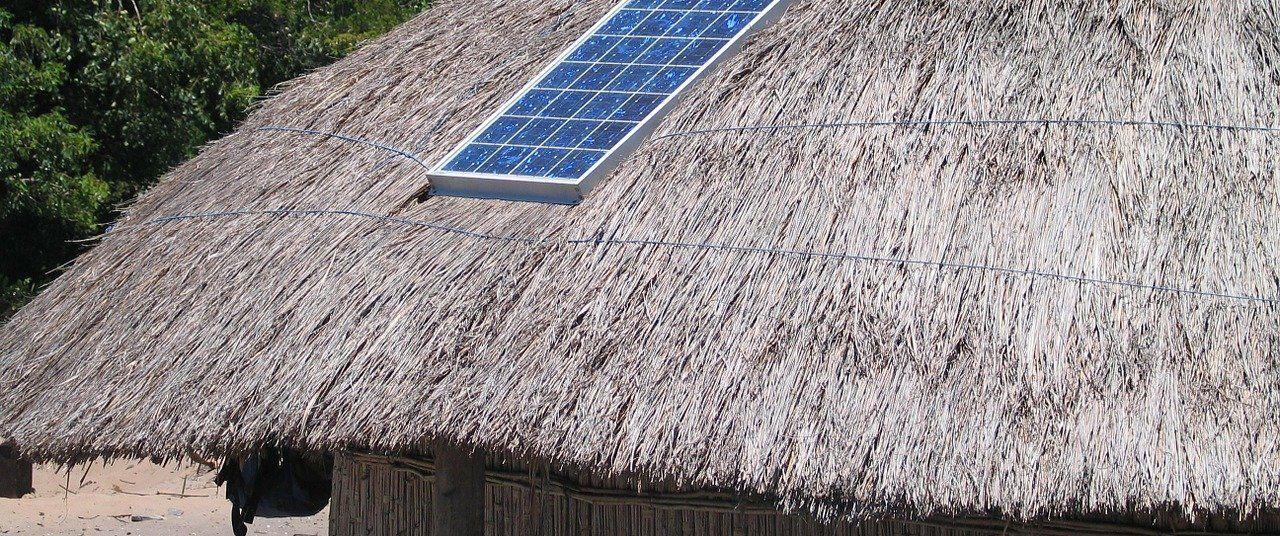
See the webinar announcement here.
The European Microfinance Week (EMW) is one of the top events in
the financial inclusion calendar and a unique meeting point for microfinance and
financial inclusion professionals working worldwide.
Natalia, as co-head of the European Microfinance Platform Green Inclusive & Climate Smart Finance Action Group,
moderated two sessions: ‘Investing in Green Inclusive Finance’ and the ‘Green Index
Training’.
On November 5th, HEDERA and UNCDF invited all interested persons to join a webinar
entitled 'Energy Access Assessment Methodologies - The Multi-Tier Framework (MTF):
Measuring what matters".
This webinar series is being jointly organized by HEDERA and UNCDF as a contribution
to the Renewable Energy Challenge Fund, through HEDERA's project with UNCDF.
Watch the webinar recording here.
Named after the Founding Director of the Institute for Advanced Sustainability
Studies (IASS), Professor Dr. Klaus Töpfer, the fellowship honors and
supports individuals who are committed to sustainable development.
For Natalia and HEDERA, the IASS is an ideal place to bridge research and praxis,
and it is an honor to commit to Klaus Töpfer's values, linking science, politics,
and society to make the world a better place.
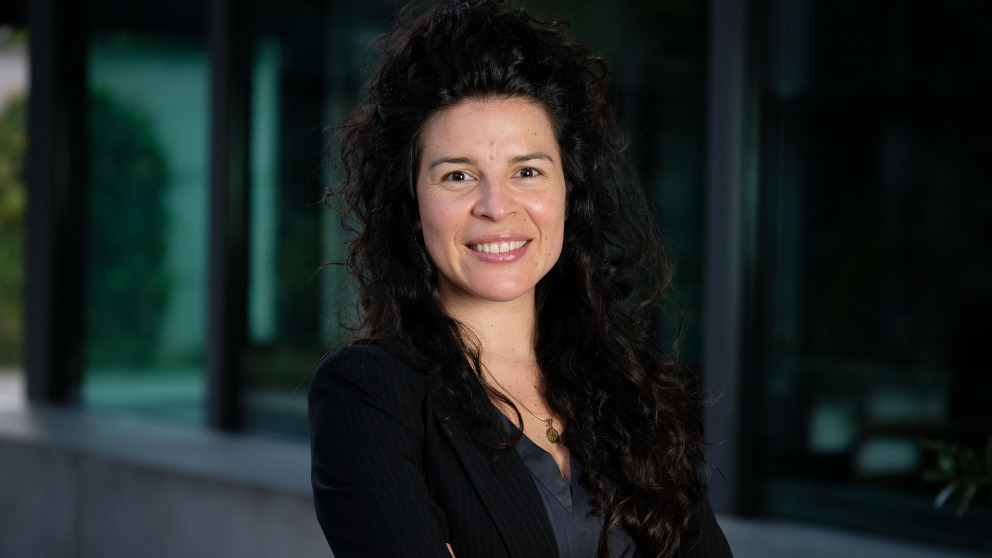
Read the IASS press statement here.
Within the framework of the virtual training program on Sustainable Microgrids organized by the Comité Nacional Colombiano de la Comisión de Integración Eléctrica Regional (COCIER), we discussed methodologies for measuring demand for microgrids, with a particular focus on using the Multi-Tier Framework for energy access measurement.
See the course webpage here (in Spanish).
We are excited to announce our partnership with United Nations Capital Development Fund (UNCDF)
on the digitization of impact assessment in Uganda.
We are going to provide digital tools and support to 10 energy companies funded by
UNCDF's Renewable Energy Challenge Fund to help them digitize their processes and
track their progress in energy provision, using the Multi-Tier Framework (MTF) and the
Progress out of Energy Poverty Index (PEPI) methodologies for energy access
assessment.
Join us in our upcoming webinar series, within the framework of this project. Stay
tuned!
On Friday, August 28th, Natalia participated in a webinar called "The 5th
Orientation Day, ZNI (Non-Interconnected Zones) Colombia,"
led by the Superintendencia de Servicios of Colombia in Bogotá. The webinar focused
on how to align strategies in order to achieve 100% electrification in Colombia.
The discussion was quite fruitful, and HEDERA plans to partner with the
Superintendencia de Servicios on research projects in the near future.
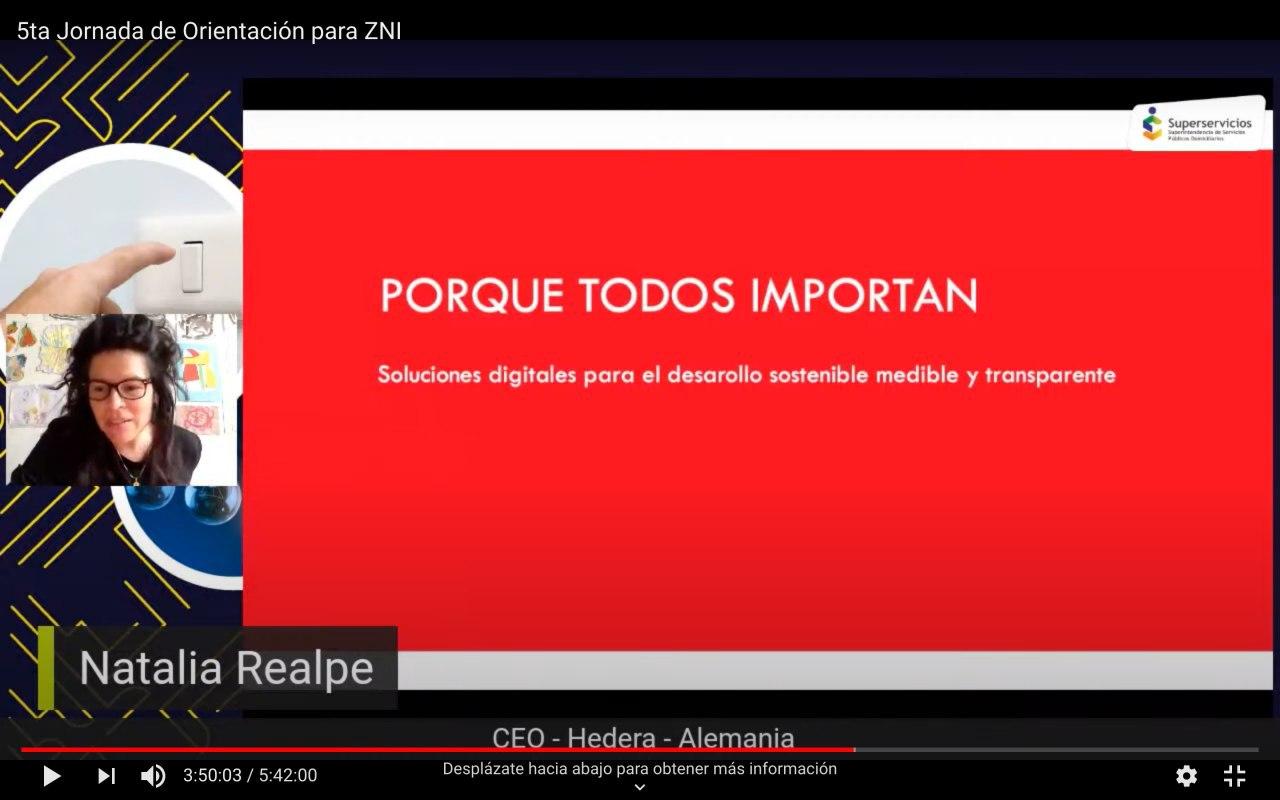
Watch the session recording here.
Alberto recently gave a pitch for HEDERA at the Rooftop Pitch Potsdam 2020, held on
August 11th and organized by Potsdam Science Park.
HEDERA was the only startup present focused on impact measurement/sustainable
development
and will participate in the next round of meetings with investors.
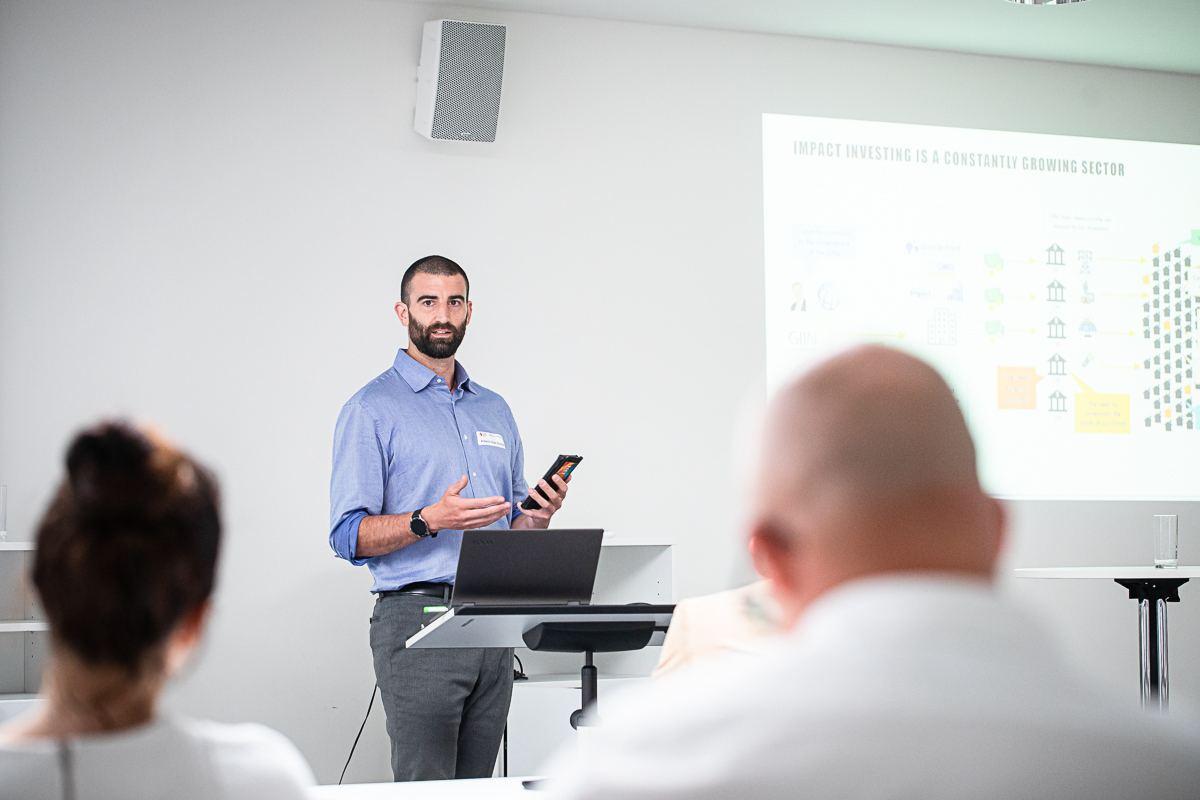
The first day of the forum, in the panel discussion entitled How to measure and
manage the sustainability impact of new ventures?, moderated by Klaus
Fichter, the panelists explored the relevance and implications of impact assessment
for new ventures, as well as in the development sector. In a debate style format,
together with Frank Ackermann, SDG Investments' Managing Partner, and Karl H.
Richter, Executive Director and Co-Founder of EngagedX, Natalia gave her insights on
the approach towards impact assessment from two perspectives,
that of a social entrepreneur and that of the director of a company conducting
impact assessment for the microfinance sector.
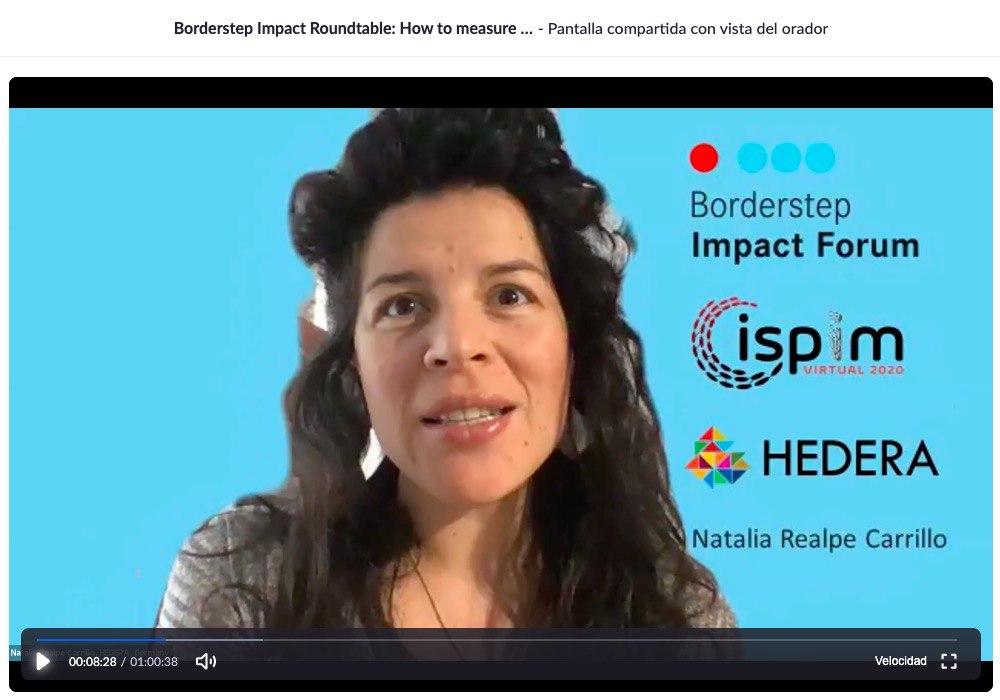
The second day, in the session entitled Digital approaches and tools for the
assessment of sustainability impacts of new ventures,
Natalia presented HEDERA's approach and vision regarding impact assessment, as well
as the tools we have developed for MFIs.
Through the lens of why and how, Natalia revealed HEDERA's
background, main purpose, and revolutionary goal of changing perspectives on the
business-as-usual approach to impact assessment.
nachhaltig.digital is a platform for sustainability and digitization in small and
medium-sized businesses. Initiated by DBU and B.A.U.M., it promotes examples of best
practices.
We are proud to be one such example!
Read Natalia’s interview here and check out the map here.
As the novel coronavirus continues to rapidly spread across the world and throughout
the most vulnerable communities, we need to be able to quickly and easily identify
at-risk people who may be infected, as well as determine and meet the needs of
people at the bottom of the pyramid.
For this purpose, we have developed a simple COVID-19 diagnostic questionnaire and
incorporated it into our HEDERA collect mobile app. We have also enabled several
different surveys that users can select on the impact of COVID-19 and the lockdown
on people and their needs during this time.
Learn more about the COVID-19 toolkit here.
Organizations can use the app, including the COVID-19 questionnaires and our
standard surveys on access to basic services, poverty measurement, and agriculture
monitoring for SDG assessment, along with the associated dashboards, for free until
September 30, 2020.
If interested, please fill out the contact
form or send an email to contact@hedera.online.
Dear community,
We are conscious of the challenges ahead, considering the surreal
situation we are facing with the spread
of COVID-19
worldwide.
For those NGOs working on sustainable development and committed to
supporting their communities, which have had to cancel in-person meetings,
trainings,
workshops, or conferences, we are offering
our training platform
(available in multiple languages) for free as a
contribution during this crisis.
The platform, built on the open source framework Moodle, enables trainers to create and manage their own
content,
follow up on participation, and interact directly with the trainees.
You can upload all kinds of multimedia, create surveys, forums, exercises, etc., and
conduct webinars and virtual classes.
The offer for free access to the fully administered platform is valid for eligible
organizations until September 30, 2020.
Feel free to contact us so we can schedule a
call to discuss and give you and your colleagues/trainees/students
access to the platform.
Stay healthy and safe, and keep up the hard work.
Your commitment to improving this world is so crucial, now more than ever.
Your HEDERA team
Today, a first-of-its kind webinar on environmental impact measurement will take place at 14:15 CET. It will be decisive in determining the future of frameworks for investors and their investees in the microfinance sector to manage and measure environmental impact. Together with Anna Kanze - Grassroots Capital Management - and Jurgen Hammer - Social Performance Task Force - HEDERA will be moderating an interactive webinar for the SPTF investors working group, streaming from Lisboa, to explore the challenges in tracking institutions' environmental commitment and discuss the future of these frameworks for the sector.
Proud to announce that HEDERA will receive financial support
from the
German Federal Environmental Foundation
(Deutsche Bundesstiftung Umwelt)
through the Green Start-up
Program.
The program is dedicated to companies - in the early stage - that develop innovative
solutions combining sustainability with digitization.
We are extremely honored to be part of this program and
network and excited to
contribute to the sustainable entrepreneurship sector in Germany and abroad!
Read
the official press release of the DBU
here.
Every year, the startup platform
für Gründer
releases a ranking of German startups, based on the results of more than 150 startup
competitions across the whole country.
The study offers an overview of challenges, needs, practices, and achievements
of the selected startups.
We are extremely honored to be among the best 50 startups in Germany!
Download
the full publication here.
HEDERA was nominated by the Center for Entrepreneurship for the
Berliner Volksbank StarTUp Award 2020, which premiates the best
teams hosted at the TU Berlin's startup incubator in the previous year.
The competition was hosted by the
BPW
Berlin-Brandenburg
in the framework of the first Kontakt-Abend of the BPW 2020. Together with
Sopher
and Kamioni,
we had an exciting time on the stage.
Many thanks to the Berliner Volksbank for sponsoring the prize, the Center for
Entrepreneurship
for the nomination, and the BPW for hosting this great event.
And congratulations to Kamioni!
2019
Natalia was invited to share her experience and personal insights
on her professional and academic career at the Career Day for
International Junior Researchers at the TU Berlin on November 26th.
We are very grateful to Juliane Wilhelm for the invitation. It was an
exciting event, and we strongly encourage international researchers to
work hard and believe in their dreams.
You can read
the full TU press release here (page 11).
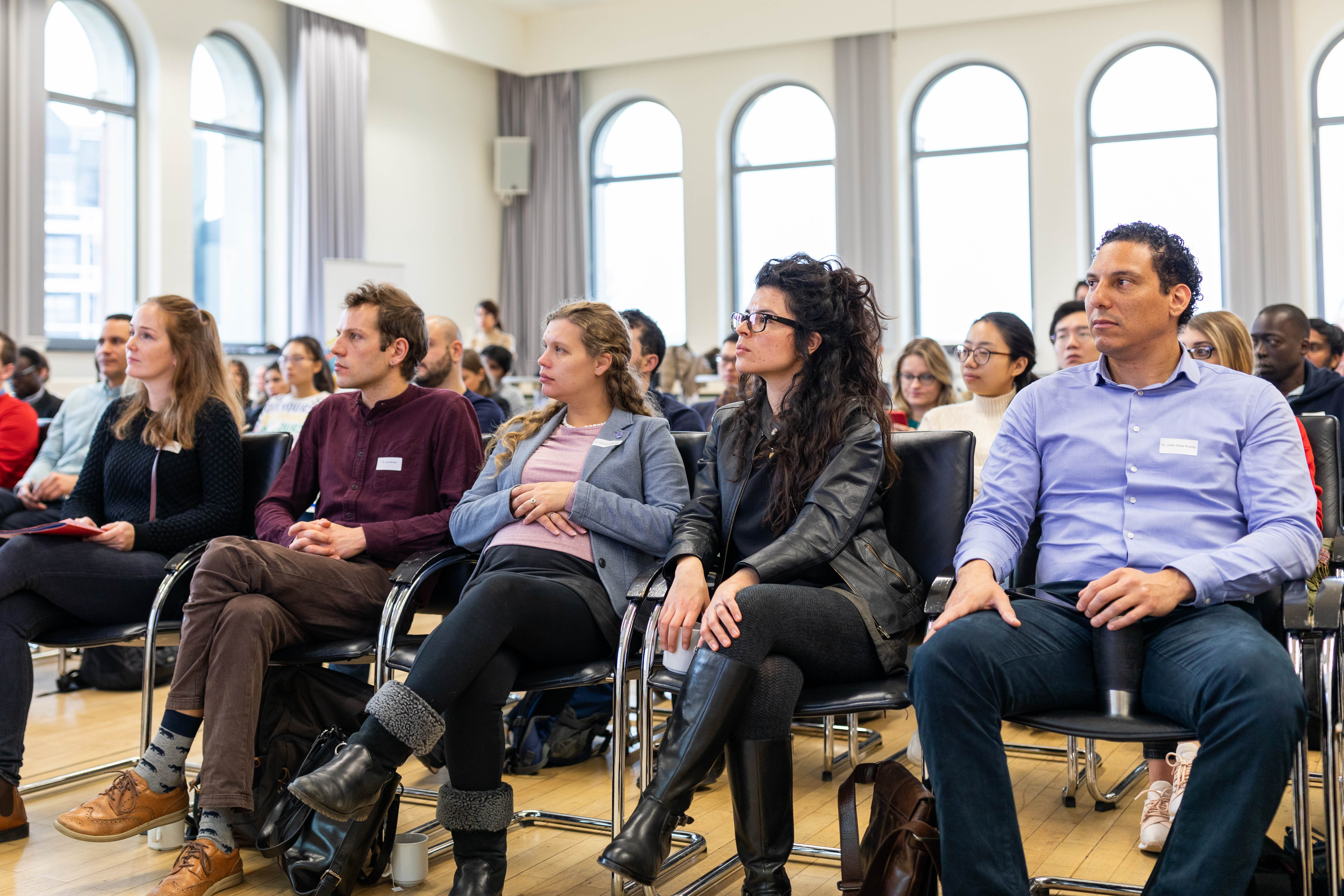
Photo: Felix Noack (TU Berlin PR)
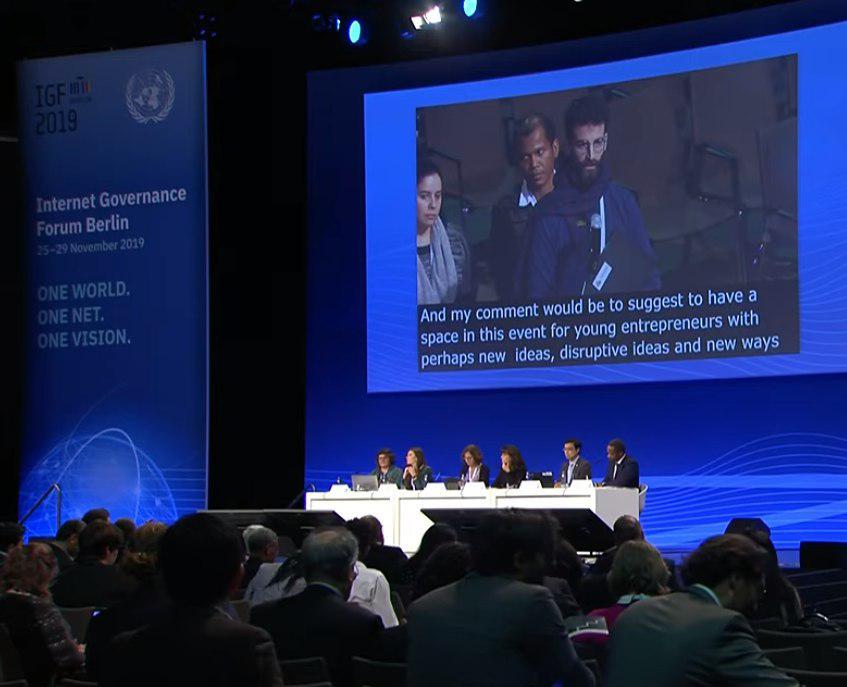
The Internet Governance Forum (IGF)
is an annual multistakeholder forum
for inclusive policy dialogue on shared principles, procedures, and programs
that shape the evolution and use of the Internet.
HEDERA is committed to the development of #responsibleAI, especially
concerning
the collection of personal data in non-European countries.
In his presentation, Alberto highlights the potential of
innovative startups to tackle issues related to Internet governance and proposes
enhancing the role of young
entrepreneurs in the Forum.
You can watch
the streaming video from the 4th day here.
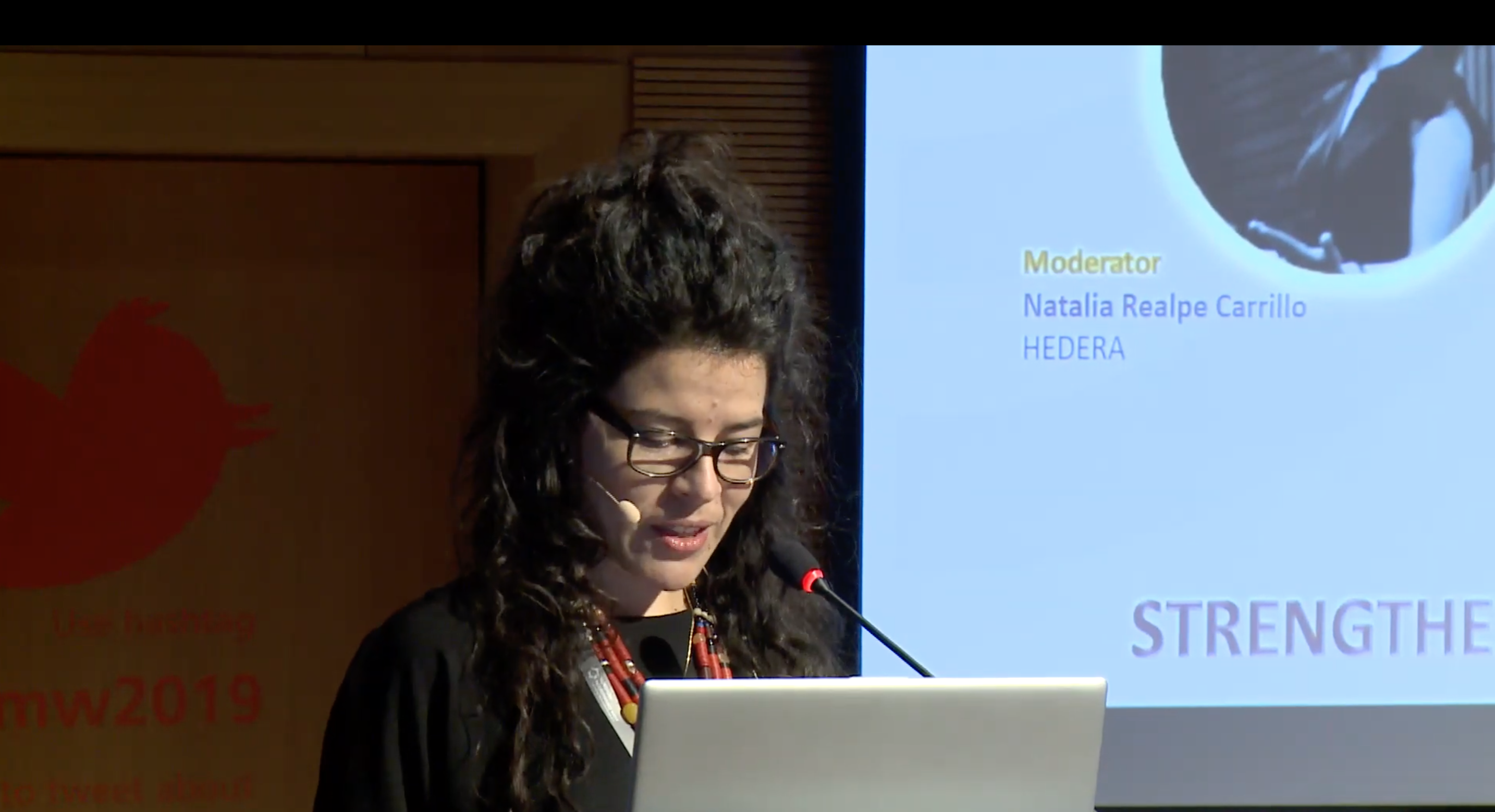
After an opening speech by Tim Donnel, our CEO
Natalia moderated the opening plenary session at the last
European Microfinance Week,
interviewing
the EMFP Award 2019 finalists.
You can watch
the full video here.
Many thanks to the EMFP for the kind invitation!
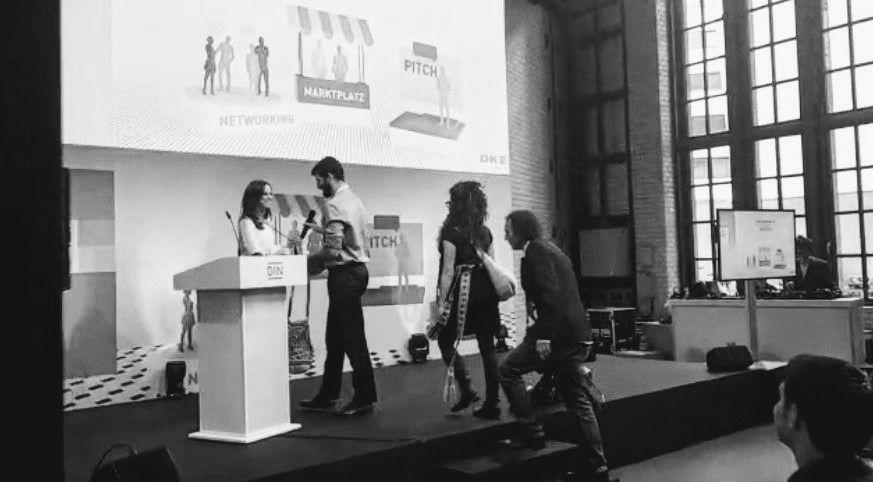
Digitization is a global phenomenon.
Billions of people expect respect with regard to their personal data.
We believe in the need for worldwide data protection standards for
#responsibleAI to support organizations working with personal
data collected outside of Europe.
At the
2019
DIN-Connect Pitch Event,
we pitched our idea of developing new standards for the data collection and AI
processes
and to extend European protection and regulation standards to
personal data collected outside the EU.
Thank to the Jury for
this unique opportunity and congratulations to the winner cirplus!
The SAM Innovator village, in the framework of the
African
Microfinance Week,
gathered together organizations with innovative solutions to empower microfinance
institutions.
The focus of the 2019 Innovator Village was the linkage between financial
inclusion and the contribution towards the SDGs.
Together with more than twenty exhibitors, we presented our
HEDERA Impact Toolkit and our
HEDERA Training e-learning platform.
Many thanks to the organizers and all our visitors!
The
Research Meets Africa conference, organized in the
framework of the African Microfinance Week (SAM), aims
to promote research and innovation in the field of inclusive finance in Africa by
connecting researchers from African and international universities
with practitioners in the sector.
The main focus of the conference was the contribution of inclusive finance to the
Sustainable Development Goals (SDGs).
Natalia presented our paper, A decentralized approach for assessing energy access
at the household level to
monitor and maximize the impact of inclusive finance towards SDG7, related
to the results obtained with
the HEDERA Impact Toolkit in our case studies.
We are thankful to ADA for organizing this meeting!
The competition
(Gründerwettbewerb Digitale Innovationen) is open
to all German start-ups in the area of Information & Technology.
The prize is sponsored by the German Ministry for
Economics
Affairs and Energy
and awarded, twice a year,
by a jury of experts in business, economics, science,
and engineering.
We are happy to announce that today, at the EMO in Hannover,
HEDERA was awarded
one of the prizes of the first competition phase in 2019.
We are thankful to all the people who supported us throughout this journey!
Follow us on LinkedIn
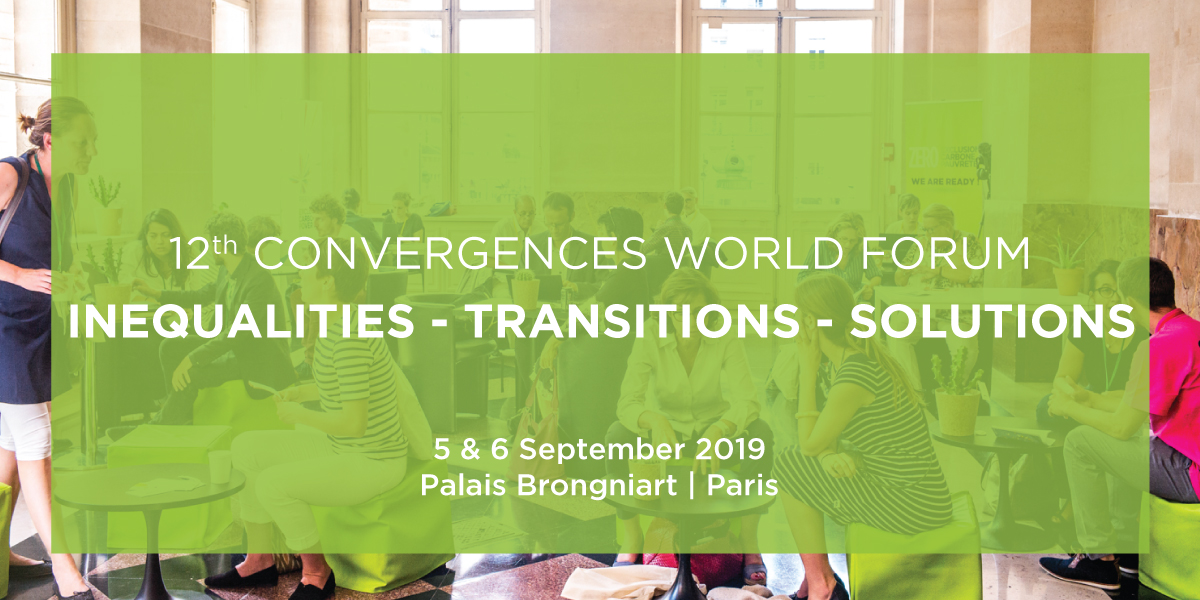
HEDERA is proud to have participated as an exhibitor at the
12th
Convergences World Forum
“Inequalities – Transitions - Solutions”!
The 12th edition of the Convergences World Forum took place on
September 5th & 6th at the Palais Brongniart in Paris.
More than 5,000 attendees and speakers from industry, civil society, government,
academia, and media gathered to share ideas and build solutions around the theme
“Inequalities – Transitions - Solutions”.
We were an exhibitor, along with Babyloan, ADA, Financesol, Finance for Tomorrow,
and ENDA, at the Finance4Good village.
Thanks to the organizers and to all our visitors!
ACTED and Convergences invited HEDERA to pitch at the 3Zero House
to convince partipants that access to finance can enable
sustainable development.
Sharing the stage with LABEZZ, ADA, Finance for Tomorrow, and FinanceSol, we were
inspired by the commitment of these organizations.
Many thanks to the organizers!

HEDERA was nominated among the top three teams for the
special sustainability award at the Business Plan Wettbewerb
(BPW) Berlin Brandenburg.
Check out our video presentation!

Natalia presented HEDERA at the SDG Conference for Africa
in Kigali (Rwanda)
Special thanks to the
SDG Center for Africa for the invitation!
HEDERA in the Tagesspiegel!
Natalia has been interviewed for the
opening of the EINS coworking space at the TU Berlin
A big thanks to the Centre for Entrepreneurship - we are happy to be
part of this community!
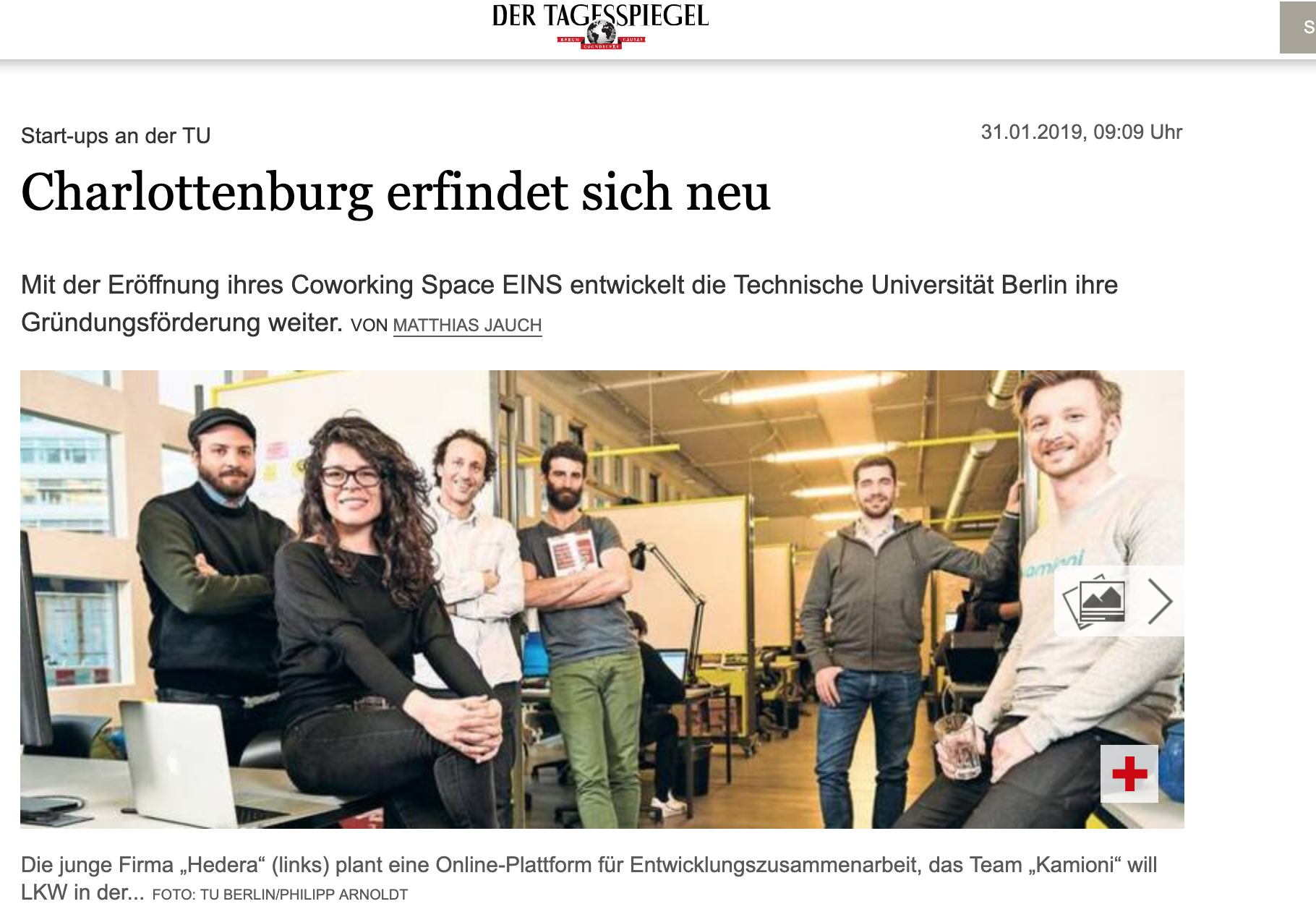
2018
Natalia at the European Microfinance Week in Luxembourg: Workshop on the latest energy access metrics with the Green Inclusive and Climate Smart FinanceAction Group
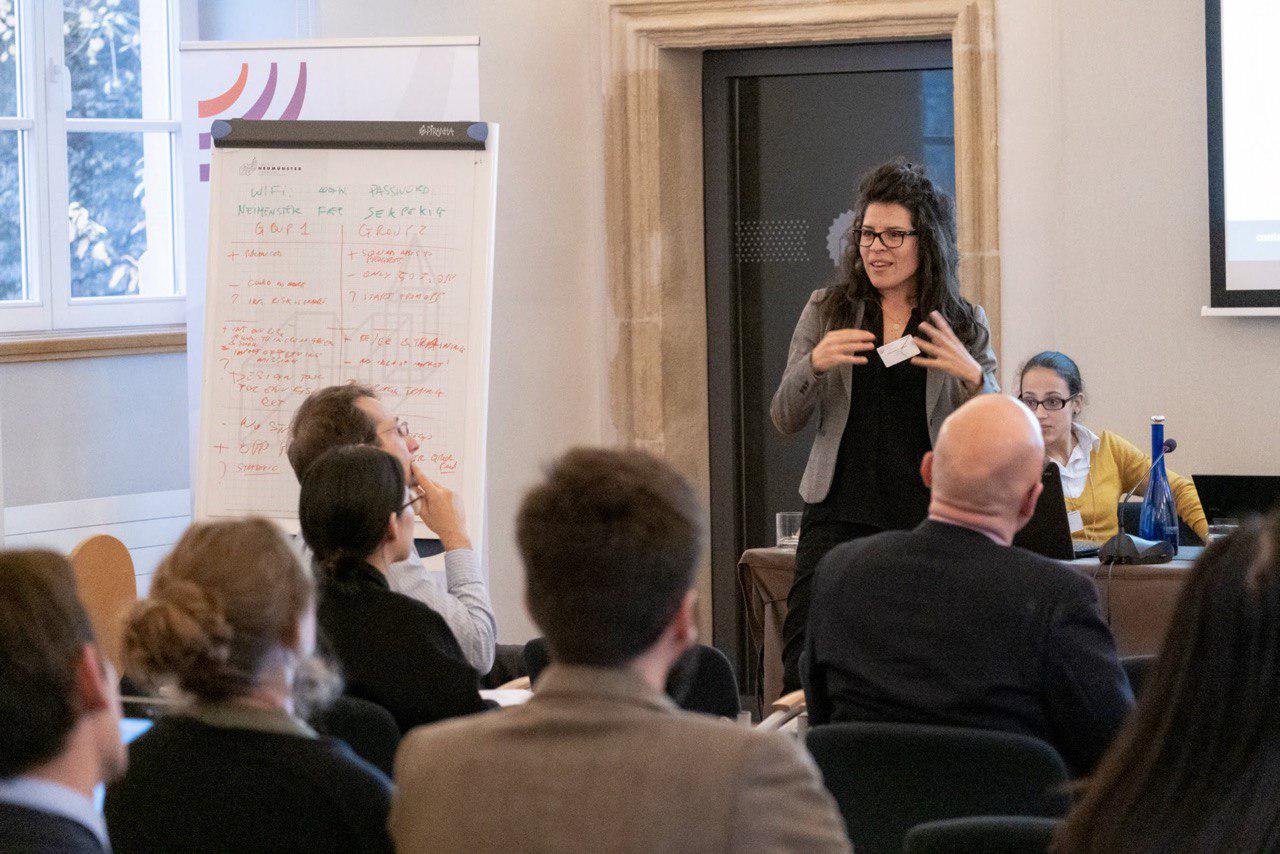
Our first time on stage! HEDERA organized the session entitled Financial sustainability of renewable energies in Colombia: Myth or Reality at the first Convergences Forum Colombia (Bogotá, 6-8 November 2018).
